- Skip to main content
- All Articles
- Study abroad info Articles
- Study abroad info Career prospects
- Choosing where to study
- Choosing a subject
- Applying to a university
- Financing your studies
- Getting your visa
- Before you leave
- Housing & accommodation
- Once you arrive

What is a work placement?
Work placements can form an essential part of a degree or qualification. We find out just what they are all about.

Having work experience as an international student can be a great way to stand out in a competitive job market. In addition, being exposed to a professional environment while studying can enhance your knowledge and skills. Work placements can be the ideal way to augment your experience in your field of study and help you complete your qualification. We investigate what a work placement is, what you can expect if you undertake one and some of the benefits.
How do work placements work?
Work placements are programmes of structured work experience that form part of a degree. Completion of the work placement is an essential part of achieving the degree. In most cases, work placements occur during regular term time and can be anything from three months to a year in duration.
Some degrees or qualifications that include a work placement are known as ‘sandwich courses’. The reason for this is that your work placement usually occurs in the second year of a three-year degree. Some universities may also describe a work placement as a ‘year in industry’ or ‘professional placement’.
Find out more about internships .
What will I do at a work placement?
What you do at a work placement will depend on the role you'll be doing and the degree you're studying for. It is not expected that you'll have all the professional knowledge and skills needed to start with. A work placement is much more about developing these through the undertaking of tasks and projects. However, employers are looking for a student that is work ready and possess a good level of skill for a role.
Some of the tasks you'll do will be like that of a full-time employee. Don’t feel discouraged if some work you do is at an entry-level, this is all part of the learning experience. Your work placement may be evaluated in a similar way to your academic study, with your employer and university jointly assessing your performance. Some tips for doing well include:
- Take on as many new tasks as you can.
- Network and meet new people.
- Practice your new skills and knowledge regularly.
- Volunteer for extra opportunities or work.
- Fully explore the career paths and options .
You must make sure to complete any formal assignments, projects or reports related to your work experience. Finishing these well can play a significant role in your assessment.
Are you interested in discovering more about graduate schemes ?
How do you qualify for a work placement?
Qualifying for a work placement may depend on whether it is a compulsory part of your degree. If completing a work placement is essential for getting your degree, your university will usually have a structured programme of work placements and undertake the organization. Universities will also help you identify the most appropriate work placement for your profile.
That is not to say that you will not have to apply for a desirable work placement through your university and undergo an interview or vetting process. Work placements can be competitive, so your academic performance can play a role.
If a work placement is not part of your curriculum, this does not mean you cannot undertake one. You can organize your work placement by working through your university’s careers office or searching independently for opportunities. Make sure to do your research and prepare well before applying. Getting a work placement is a great way to enhance your CV and prospects after graduation.
Are you wondering about jobs that didn’t exist 10 years ago ?
Will I be paid for a work placement?
It depends very much on the type of work placement you undertake. For shorter work placements of between one and three months, you usually do not get paid. However, if you undertake a work placement as part of your course that last between six months and a year, it is not unusual to receive a small salary.
Salaries will differ according to the industry that you work in and what role you fulfil. They can vary widely, but usually, an employer will pay an entry-level or living wage, potentially in the region of GBP 12,000 to GBP 23,000. It’s important to discuss wage expectations and any financial matters with your university and prospective employer before undertaking a work placement.
Are you looking for a career that will make a difference ?
What is the difference between a work placement and an internship?
The difference between an internship and a work placement can seem confusing. They are however different. Internships are much shorter in duration than work placements. In addition, internships are mostly undertaken outside of term time during vacation periods. Internships are very much about learning new skills and getting oriented in an industry. Internships rarely pay a wage.
Work placements, on the other hand, most often form part of official university study and courses. They can last up to a year with the expectation of performance and an associated assessment. Academic credit is awarded for a work placement. A work placement requires both learning and active engagement in work through the completion of tasks or projects at a professional level.
Now that you are in the know about what a work placement is and what to expect you may want to expand your exploration of potential careers. You can read our guides to the top five graduate jobs in the world , how studying abroad can help your career , and how to future-proof your career .

Top 10 benefits of becoming a doctor
Being a doctor is one of the most sought after and well-respected professions and, while it’s highly competitive, it is arguably worth the commitment. If you have an aptitude for science and a desire to care for others, you’ve come to the right place. Here, we’re going to explore why so many students around the world decide to pursue medicine, focusing solely on the benefits of becoming a doctor. How to become a doctor In

Careers for humanities graduates
Perhaps you’ve finished your humanities degree and need some advice on finding a job. Maybe you’re thinking of applying to study a humanities course but want to know about the employment prospects. No matter what stage you’re at right now, we’re going to show you what types of careers are available for a humanities graduate so that you can feel well-informed. Although you don’t have to know exactly which profession you’d like to end up in, it’s helpful to learn
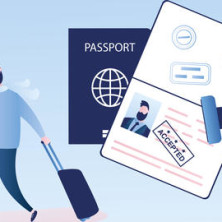
The post-study landscape for international students
When evaluating your study abroad options you’ve likely spent some time analysing what post-study opportunities and work options exist in various destinations. We know that this can be a deciding factor in choosing where you end up studying. Whether it’s the professional and career prospects for your chosen area of study or the chance to gain valuable experience and spend more time in a country, it’s important to know what’s on offer. We’ve investigated some of
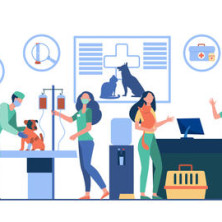
Five traits every veterinarian needs
When deciding on your potential course of study, it’s always a good idea to consider your desired career path at the same time. Studying for a degree in veterinary medicine is a significant commitment with the end aim of a rewarding career as a veterinarian. While having an affinity for the subject matter is important, you’ll also need to check whether you have some of the key traits that would make you suitable for the job. We’ve turned our lens on veterinary

Get in touch
- Log in
- Site search
Work placements
Allowing you to step away from your studies and into the world of work for a fixed period of time, work placements help you to increase your skills and clarify your goals
What are work placements?
- Usually completed during term time, a work placement is an optional or compulsory element of some degrees.
- Placements are typically taken as part of a 'sandwich' year and are also known as a 'year in industry' or 'placement year'.
- If you're studying on a sandwich degree, you'll typically complete the placement between your second and final year of study. You'll be assessed and receive academic credit for the placement.
What's the difference between work placements and internships?
People often confuse work placements with internships, but the two types of experience are different. While internships are usually undertaken over the summer months or after graduation to gain experience in a particular field, work placements are taken as part of a degree. Students on a placement year are completing a module and receive academic credit for the year.
How do I arrange a placement year?
If you're studying for a course that includes a work placement, you may find that the organisation is simply allocated to you.
However, if this isn't the case then you should arrange your own placement. Your first port of call should be your university careers service, as they will have a huge database of employer and alumni contacts. Careers advisers will also be on hand to help with applications. Take advantage of work experience fairs to make contact with employers and search for suitable placements online. You can also target employers speculatively to find and secure work placements.
When arranging your own work placement, ask for the terms to be agreed in writing beforehand, as placements aren't covered by employment legislation. If you're in any doubt about the organisation or the activities, you should seek further advice from your careers service.
If you struggle to arrange a placement there are a variety of things you can do to build your skills and gain experience. You could apply for virtual work experience , get involved in online volunteering opportunities or apply for temporary or part-time roles. All these activities will build your transferable skills and demonstrate to employers your tenacious, proactive, outside-the-box thinking.
How do I apply for a placement?
If the placement is part of your course some universities may organise opportunities on your behalf, while others will assist you in identifying and applying for placements yourself.
Alternatively, if you're arranging your own placement - one that isn't an essential element of your course - companies may require you to complete a formal online application, detailing what you could bring to the role. Applying for a work placement can be as competitive as applying for a permanent job, with many companies holding formal interviews and assessment centres . It's therefore essential that before you apply, you thoroughly research the company and the role.
How long do they last?
This varies depending on your course and the type of placement you're undertaking.
Optional work placements are often arranged during the holidays, and last between one and three months. Other placements involve working one day a week over a longer period of time. In the law sector, one or two-week schemes are available in the form of vacation placements and mini-pupillages, which you can apply for at any time of the year.
For mandatory placements you'll likely spend a year in industry. These industrial placements are commonly found in engineering, science and construction-related degrees. Social work degrees and those in healthcare and teaching also typically include placement years. Most universities have a placement tutor to help you arrange your year with an employer.
How is an industrial placement assessed?
If the work placement is a compulsory part of your course, it's likely that it will be formally assessed or accredited. Assessments vary and might include the completion of specific tasks or projects, writing a report or reflective log, or using the learning from a work placement in another assignment or course activity.
If the placement isn't a compulsory element, then it's a good idea to write about your learning in a personal/professional development portfolio (PDP). This will help you if you need to call upon your experience later to answer interview questions.
Will I be paid?
Whether you receive a wage during your work placement will depend on the type of placement you undertake and the length of time you work.
If a placement year is a mandatory part of your higher education course then you don’t usually get paid for this.
Other types of work placements are paid, for example if you find and apply for a placement yourself the majority of opportunities come with a competitive salary.
Short term work placements are often unpaid, although many organisations cover expenses.
Always discuss matters of payment with the organisation you'll be working for and be clear where both parties stand before starting your placement.
Why should I do a work placement?
There are a number of advantages to completing a work placement. For example, they:
- let you apply your knowledge and skills in a work setting
- increase skills and competencies highly sought after by employers
- give you an insight into the way organisations operate and the challenges they face
- help you to understand a particular job or industry
- provide you with networking opportunities
- enable you to attend training courses
- clarify your career goals.
The benefits include:
- finding a supervisor who may be able to act as a referee for you in future job applications
- attendance at in-company training courses.
Where can I search for opportunities?
- Search for placements on this site .
- Take a look at our employer profiles to find out what's on offer.
- Use social media to look for vacancies and connect with employers.
Small and medium-sized enterprises (SMEs) can provide students with fantastic practical experience; so don't discount them when it comes to work placements. They're often overlooked, but small businesses are great for allowing you to act on your own initiative and develop your own way of working. What's more, they provide superb opportunities for networking. If you're a confident, creative and motivated team player, you could quickly become an asset at an SME.
Find out more
- Learn more about work experience opportunities.
- Discover 5 ways to benefit from your institution's links .
How would you rate this page?
On a scale where 1 is dislike and 5 is like
- Dislike 1 unhappy-very
- Like 5 happy-very
Thank you for rating the page

Co-op, Work Placements, and Internships 101: A Guide for International Students
- August 8, 2023

Co-op, work placement, and internship are three work experience terms that people often use to mean the same thing. While each of these options let you apply classroom-based learning to work in your field, they actually have key differences, too. We’ll take a closer look at some of these below.
Many employers actively look for grads with work experience. So, taking a program with a co-op, work placement, or internship can set you ahead of your peers by developing your practical skills and working while learning.
Below, we’ll explore different ways international students can gain valuable work experience while studying abroad in Australia, Canada, Ireland, the United States, or the United Kingdom.

Australian universities embrace work-integrated learning opportunities. Many academic institutions are actually increasing the kinds of opportunities they offer. You might see programs with projects, simulations, fieldwork, or internships.
Internships
Many international students in Australia complete an internship related to their field of study. For some courses, it’s even compulsory. When an internship is required, you’ll receive academic credit. For example, say you land a journalism internship. You may be conducting interviews, researching stories, assisting colleagues, and preparing notes. Australian internships vary in length and, unlike in other countries, are not usually paid positions. However, international students who attend private Australian colleges often have paid internships.
International students can also get hands-on work experience with a project. Universities Australia defines projects as activities “designed with and for employers, such as client-assigned projects.” These are the second-most common type of work experience in Australia. To get started, academic institutions usually connect students with organizations for projects that contribute to the public sector.
Simulations
According to Universities Australia, a simulation is “where a student experiences all the attributes of a placement or workplace task in a university setting, such as a moot court.” A moot court simulates an arbitration for parties involved in a legal dispute. If you’re studying law, this practice can help you build the necessary skills to succeed as an advocate. You’ll improve your oral advocacy, persuasive writing, research, and legal analysis skills.
Fieldwork is a great way to build practical skills that fit industry and community demands. Universities Australia describes fieldwork as “learning activities that occur off-campus and in person, such as archaeological excavation or environmental monitoring .” Studying agriculture or environmental studies? You’re most likely to have fieldwork opportunities.
Australian institutions to consider: Australian National University , James Cook University , and Murdoch University .
Canada’s most common types of work-integrated learning opportunities are co-operative education, placements, and internships. Interested? International students must apply for a co-op or intern work permit first. You can apply for a permit either before arriving, with your study permit application , or after you arrive and are approved to begin a placement.
Co-operative Education
Co-operative education, or “co-op,” combines classroom learning with practical full-time work experience. A co-op program might have alternating academic and paid work terms or multiple consecutive work terms. The number of required work terms varies by program. For programs two years or longer, you must spend the equivalent of 30% of the time you spent in the classroom in a work term. For programs two years or shorter, the ratio is 25%.
Placements/Internships
An internship or placement is supervised full- or part-time work experience. Or, it can be a practice placement related to your area of study. It can be paid or unpaid work, but after completing an internship, you’ll receive academic credit. You may complete an internship during your program. Or, you can finish it after completing your coursework and before graduating. Internships are usually between 12 and 16 months long.
Canadian institutions to consider: Centennial College , Seneca College , and the University of Waterloo .
Did you know that international students taking eligible courses that are at least one year long don’t need a work permit to work in Ireland ? Eligible students with Stamp 2 permission may work 20 hours per week when class is in session, and up to 40 hours per week on holiday breaks. Internships are the most popular kind of work-integrated learning opportunity.
Students enrolled in courses in the Degree Programme may do an internship as part of their programme. This placement must be a key part of the programme, and not take up more than half of the programme’s duration. (So, if you’re taking a four-year course, you can do a maximum of two years of internships.) Also, self-employment cannot currently count towards your internship.
Irish institutions to consider: National College of Ireland , Queen’s University Belfast , Trinity College Dublin , University College Cork
United Kingdom
Institutions in the United Kingdom offer students the opportunity to participate in internships, work placements, and sandwich courses to gain valuable work experience. While there are some similarities between the three, they are actually very different.
Internships can be a week or a year long. You’re most likely to complete one over summer vacation. Students don’t typically receive academic credit for completing an internship, although it may be recognized by professional training organizations. By law, students working as an intern are paid at least the National Minimum Wage . As it’s not unusual for organizations to bring on an intern full-time, an internship could be the first step in a student’s exciting new career.
Work Placements vs Sandwich Courses
In the UK, “sandwich course” is a popular nickname for a work placement. Although they’re similar concepts, these are actually different types of work experience. Read on to learn more.
Work Placements
Work placements are a requirement for some courses, and students who complete them earn academic credit, but not usually a salary. Students often complete work placements during a school term.
Short-term work placements range in length. If your placement is one to three months long, you’ll do it over the summer holidays. Conversely, you’ll work at longer placements for one day per week during school terms.
Sandwich Courses
A sandwich course is a degree program where students have at least one opportunity to work in their chosen field for nine months to a year between their academic studies. Sandwich courses take more time than a standard degree, but offer many benefits. For one, the connections that you make during your work term can be professional references once you graduate, or might connect you with open roles at the company you worked at while studying.
Thick vs Thin Sandwich Courses
In the UK, sandwich courses can occur at different stages in the completion of a degree . Accordingly, some courses are described as “thick,” while others are “thin.”
Often, a four-year degree includes a “thick sandwich course.” Students spend the first two years of a degree on coursework, followed by a third-year placement.
Conversely, a “thin sandwich course” refers to a three-year degree. In this case, the placement (usually paid) is split up into two halves. In your first year, you’ll complete six months of practical work, with another six-month work term during your final year.
UK institutions to consider: Coventry University , Nottingham Trent University , and the University of Hertfordshire .
United States
International students in the US have two options for gaining work experience while studying: Curricular Practical Training and Optional Practical Training. Students must complete their first year of studies before they are eligible for these programs.
Curricular Practical Training (CPT)
Curricular Practical Training (CPT) gives students the opportunity to participate in off-campus training, work experience, or an internship. Opportunities vary by program. For some degree programs, completing a CPT internship is a program requirement that students will need to fulfill before graduating.
Optional Practical Training (OPT)
Optional Practical Training (OPT) allows students to find off-campus employment or an internship within their field of study. If you’re enrolled in an eligible science, technology, engineering, and mathematics (STEM) program, consider applying for the STEM OPT extension . STEM OPT can enable up to 24 more months of work experience, which is a great way to boost your resume with American work experience. International students interested in OPT must apply for an additional visa.
There are two types of OPT:
- Pre-Completion OPT : gain related work experience before graduating. Work up to 20 hours per week while you’re studying, and up to 40 hours per week when on a break, like summer vacation.
- Post-Completion OPT : work at a job in your field of study for up to 12 months after graduating. (Unless you’re eligible for the STEM OPT extension, then up to 3 years.)
US institutions to consider: Arkansas State University , California State University, East Bay , and the University of Arizona .
We hope this inspired you to consider programs with work-integrated learning. Whether they’re a placement, fieldwork, or an internship, each can help you boost your career.
Ready to study abroad? Explore top programs on ApplyBoard !
APPLYINSIGHTS DATA BLOG
The most important stories in international education, backed by data, more applyinsights.

Canada’s International Student Population is Getting Older. Here’s What That Means for Canadian Institutions

Survey Shows 40%+ of International Students Considering Markets Beyond the “Big Four”

Canadian Institutions, Here’s How to Maximize Study Permit Approval Rates in the Cap Era
Check out our blogs.

IELTS Reading Preparation: Top 10 Tips to Increase Your Score

What Is IELTS and How Do I Prepare for It?

How to Apply for a Study Permit Through Canada’s Student Direct Stream (SDS)

101 Frederick St, Kitchener, ON N2H 6R3
© 2024 ApplyBoard Inc

University is expensive – how a mid-course work placement can help with costs and careers
Senior Lecturer in Economics, University of Surrey
Assistant Professor in Economics, National College of Ireland
Disclosure statement
The authors do not work for, consult, own shares in or receive funding from any company or organisation that would benefit from this article, and have disclosed no relevant affiliations beyond their academic appointment.
University of Surrey provides funding as a founding partner of The Conversation UK.
View all partners
Students are struggling financially. A 2022 survey from the Office for National Statistics found that half of students in England felt they were facing financial difficulties, and that one-quarter of students had borrowed more to cope with the cost of living crisis. In England, tuition fees for bachelor’s programmes are the highest among OECD countries .
In addition to the financial burden of a degree, students have to deal with stress about getting a job in the competitive labour market and the prospects for their future career. A report on the graduate job market found that in 2022, there were an average of 39 applications for each graduate-level vacancy.
A 2021 survey of young people found that over one-third felt uncertain about their career plans. University students found a lack of work experience to be a key obstacle in applying for jobs and close to one in two university students didn’t feel prepared for getting a job.
Working during a university degree is one way of both gaining work experience and some much-needed cash. But while many students might opt for a part-time job alongside their studies, this work experience is unlikely to be related to students’ studies or career aspirations, as it typically covers students’ short-term needs.
But a work placement – a period of employment in a relevant industry in the middle of a university course – can offer significant benefits, including finding a job aligned with their career goals after graduation.
- Work placements
Many UK universities offer the option between a standard three-year programme and a four-year programme with a work placement – known as a “sandwich” degree . Students who undertake a work placement complete the first two years of their programme, and spend their third year working in a relevant industry before completing their degree in the fourth year. This option gives students the opportunity to gain full-time and typically paid work experience with an organisation.

Because work placements are part of a degree programme, universities help students find an appropriate placement. Support is available from the universities’ careers services, offering advice that helps students search for the right employer and apply for jobs.
The placement year extends a student’s time at university, but they pay a reduced tuition fee for the year they are on work placement: around 20% of the standard annual fee (£1,850 for a standard fee of £9,250). And the income can make a significant difference to student finances. Our research found that the average salary for economics placements is £19,000, and there are placements that offer more than £30,000 .
Students on placements develop transferable skills, such as communication, teamwork and time management, as well as industry knowledge. This may help improve their final-year academic performance when they return to study.
Benefits after graduation
Students who take a placement year also develop a professional network and obtain valuable information from employers about future jobs. This can boost their graduate employability and career success by increasing the chances of finding graduate jobs that fit their career plans. Our research found that economics graduates who did a placement were more likely to find a job that aligned with their career aspirations than graduates who did not do a placement.
There may also be earnings implications after graduation. Earlier research has shown that placement graduates in full-time employment earn on average £2,000 more than non-placement graduates. But there is substantial variation across degree subjects, for example, our recent research has shown that this value is approximately £1,300 for economics graduates. But placement students need a few years to be financially better off than non-placement graduates, as they postpone entering the graduate labour market by one year.
Despite these benefits, some students may not see a placement as a viable option. They may face pressure to finish their degree, and the extra income may not be enough to assuage their financial concerns.
Students who struggle financially are likely to take a part-time job during their studies to address their immediate needs – and the prospect of a third-year placement is unlikely to change this. Research has shown that term-time work has a negative effect on academic performance – and the impact is greater the more hours a student works.
However, working and possibly saving during a placement year could take the pressure off in the crucial final year, allowing students to focus more on their studies.
- Universities
- Student finance
- Graduate jobs

Faculty of Law - Academic Appointment Opportunities

Operations Manager

Senior Education Technologist

Audience Development Coordinator (fixed-term maternity cover)

Lecturer (Hindi-Urdu)
- International edition
- Australia edition
- Europe edition

How to make the most of university work placements
T here's only so much you can learn in a classroom – if you want to be ready for a job after university you need to have some experience of a real work place. Many university degrees include work placements as part of the course, and they can be a great way to gain industry skills and understanding.
Here's what you need to know about finding a placement and making it work for you, as well as some pitfalls to avoid.
Finding the perfect placement
Most universities will have a system in place to help you secure your placement – whether it's via the university's careers service or through your tutors.
Students of interior architecture and design at University for the Creative Arts (UCA), for example, all complete a placement as part of their third year and they get help from their lecturers to arrange their experience. Michael Thomas, senior lecturer at UCA, says: "We have a database of about 180 companies that we've built up over the years and we share this information with our students."
If you're finding the placement on your own, try and find out the name of the person who deals with work experience enquiries and get in touch with them directly.
It can be tempting to fire off emails haphazardly to as many companies as you can, but it can pay to spend more time on a focused application.
Yatin Vadhia, a second-year computer science student at Surrey University says: "Since my childhood I've always been interested in computers so the ideal company to work for has always been Google.
"I decided that rather than taking a scatter-gun approach and applying for all and any internships, I would put all my effort into doing one application. I spent a lot of time preparing and putting together the application." The approach worked and he is now part-way through a work placement at Google in Dublin.
How to make the most of your placement
Once you've found a company that is willing to have you during your allotted work experience placement, it's up to you to get the most you can from the experience.
"Always say yes," says Vadhia. "Attend meetings and get involved with as much as you can. And ask questions. As an intern you have a get-out-of-jail free card: you can ask questions that you probably couldn't get away with if you were a graduate. People understand that you are still learning."
Being "the workie" comes with its perks, but also its downsides. "Remember that you are the intern," says Pete Finnigan, a PR graduate from Leeds Metropolitan who did a placement in a marketing and communications agency in Liverpool.
"You do get great opportunities but you're still the lowest rung on the ladder so can't be surprised if you are asked to do things you might not necessarily want to do like tidying the store cupboard."
Andy Harding, founder of design agency Creative Purple and regular manager of work placement students says:
"Don't think you know more than people you work with – they've probably been doing it for much longer than you.
As long as there's a good balance of training and more informative tasks too, don't be "high and mighty" about the occasional admin job, says Finnigan. "Everyone has been where you have: you don't just come out of university straight into a role with a lot of responsibility."
Try to be open minded. "A lot of the things I did on my work placement are really useful in my job now," says Finnigan. Look for opportunities and take them. "Be proactive," says Harding. "Know what's going on around you. Understand why people are busy and keep offering to help in any way you can."
Communication between you and your manager on the placement is key to getting the most out of the experience and making a good impression.
"When you're given a job make sure to ask questions if you have them," advises Sophie Drake, a third-year media and communications student at Birmingham City University who has done placements in marketing and PR, at a record label and at her university's press office.
"Tell people when things don't make sense, even if you feel silly. It's better to understand the brief before trying to do the job. And if you do your job well you will make a great impression."
Be sociable – and that means making the effort to go to lunch with your colleagues. Sam Espensen, managing director of Conversation Creation, and someone who is used to managing work placement students, says: "Good students will be burning with questions and there might not be time to answer them during the working day. I always try to sit and eat with them and during that lunch break will answer any questions they may have."
Your experience doesn't have to end when the placement finishes. "Keep in touch," says Helen Flannery, a journalism graduate from Northumbria University who did work placements in PR and radio. "I now work for one of the companies where I did my placement."
When you're on the placement it's your opportunity to network as much as possible. "I went to networking events that your average 20 year-old student has no right to attend normally," says Finnigan. "Make the most of those opportunities. Networking is key."
If everything doesn't go according to plan it's not the end of the world. "Don't dismiss the experience if you find the placement isn't what you expected. The more experience you get, the better it will be for you."
Things to watch out for on work placements
"University placements as part of a degree can be a really great way of ensuring that you get some experience while you study," says Chris Hares, campaigns manager at Intern Aware. "However, often these placements are cobbled together without proper thought or planning."
If it's organised well a work placement can be a great part of your degree. But there are some pitfalls to watch out for too.
"Before the placement we support the students with lectures about what to expect, what to avoid and advice – it's important they're not going out blind," says Thomas.
"Make sure you're inducted into any procedures when you're on the placement," says Thomas.
This is particularly relevant if you're working in a design studio or somewhere where health and safety could be an issue, but it's also important to make sure you're receiving the training you expected from the placement.
Thomas recommends that you make personal contact with the company prior to the placement and identify who your placement manager will be – make sure someone will be looking after you.
It's not just the employer that has a responsibility towards you during the placement. "Before the placement check that your university is going to provide regular support," says Hares. "You should have a supervisor that will catch up with you to monitor how the placement is going. If a placement isn't monitored it can lead to students being exploited, unfairly treated and working for free."
If you are doing your placement as part of your course – and it counts towards your degree – then legally you don't have to be paid for your time, but the company should offer flexibility in hours so you can fit it around paid work if needed.
"Placements on the course last up to nine weeks, but the time spent varies," says Thomas. "The minimum is 10 working days. Some people work full time and others will balance it with other commitments."
Many companies, particularly in Stem industries, get that it motivates to pay – so do dig around when doing your research.
If you're struggling with managing the placement and a paid job, do speak up. Flannery says: "Be honest with the person providing your placement if you are struggling with other work commitments and come to a compromise."
It helps if you have a clear outline of the tasks you are expected to complete on the placement – and don't be afraid to ask for help with them if you need it.
"On my placements I sometimes took on too many jobs at once because I was so eager," says Drake. "Trying to please everyone can mean that you can't successfully do everything. Take on a manageable amount and get the jobs done properly. You are there to learn so do ask for as much advice as you need."
- Putting your studies into practice
- Higher education
- Advice for students
Comments (…)
Most viewed.
What are work placements?
An important component of many UK degrees, work placements help you to build academic expertise as well as to gain real-world experience. You’ll receive academic credit for your efforts, and you’ll learn the extra transferable skills needed to excel in your chosen career.
These fully-assessed placements can make studying in the UK extra special. Because on top of mastering your field of study, you’ll learn how to lead, problem-solve and make compelling arguments. You’ll also develop your ability to deal with pressure and hit crucial deadlines. All of which will make you stand out against the competition and impress employers when you graduate.
How do they work?
With many UK degrees, a work placement is an entirely optional yet integrated part of your studies.
In most cases you’ll be placed with a company or organisation for between six and 12 months, before returning for your final year of study. And this will give you the opportunity to apply the knowledge you’ve learned and skills you’ve gained within a professional environment.
This will give you an invaluable insight into the way companies work, and how to apply your learning to a future career. And as part of your placement, you will gain real experience of workplace culture and behaviour, as well as of applied skills and how to build and maintain professional relationships.
Every year, international students in the UK tell us how incredibly valuable they have found these work placements to be - increasing their self confidence, encouraging reflective practice and developing the transferable skills that employers are looking for.
When do they take place?
Work placements are typically completed during term time and will take place between the second and final year of your degree.
How long do they last?
Typically, an accredited work placement will last from six months up to a full year (sometimes referred to as a ‘year in industry’).
To ensure strict educational standards, UK rules stipulate that any work placement must not take up more than a third of your entire degree course.
How do I find a work placement that’s right for me?
The right placement will depend on your course, and the career you’re interested in pursuing. We advise you to speak with your chosen university (including its dedicated careers service) to discuss your options.
It’s also worth noting that these work placements are subject to rules and regulations, and to undertake a work placement as a student in the UK you must:
- be studying a course at degree level or above (meaning a qualification at RQF level 6 or above/ SCQF level 9 or above)
- be sponsored by a recognised overseas higher education institution, publicly-funded college, independent school, embedded college offering pathway courses or another such licensed institution - view the full list of institutions
- be permitted to work in the United Kingdom (for more information on working in the UK as an international student, visit the UKCISA website.
In addition, your sponsor must:
- be recognised as having a good track record of providing similar work placements.
- inform the UK Home Office that you will be working as part of your studies
- monitor you during your placement (as part of this, they must provide a letter for your work placement provider, containing details of the placement’s terms and conditions as well as information on how it will be assessed).
All students pay a reduced tuition fee for their placement year and are encouraged to take up a paid placement if they can. Salaries for such placements vary but you could earn from £12,000 to £20,000 for a full year in industry.
More in this section
Get the skills employers want.
Our graduates are proven to be among the most desirable in the world, with confident analytical thinking, and excellent communication skills.
Help with every step of your career
Get advice and guidance from your university careers service.
What is volunteering?
Volunteering is a great way to build experience and impress potential employers, while doing something really rewarding.
What are internships?
If you’re looking for experience of a specific career or industry, then an internship can be your perfect way to get ahead.
Making a difference: How the UK's education system helps you to think big
Andress Hamend is the founder and CEO of Punya Harapan, delivering sustainable education for juvenile prisoners in his home country of Indonesia.
Sign up to our newsletter
Get the latest updates and advice on applications, scholarships, visas and events.
- AdviserSkills ®
- Mortgage Adviser
- Financial Adviser
- Apprenticeships Overview
- FS Administrator Apprenticeship
- Insurance Practitioner Apprenticeship
- Mortgage Adviser Apprenticeship
- Financial Adviser Apprenticeship
- Latest News
- Student Benefits
- Join the Team
- Buy Now Pay Later
Home • How to prepare for a work placement
How to prepare for a work placement
26 August 2021

Many professional qualifications now include a work placement as part of the training course. It’s an opportunity to put the knowledge that you’ve learned into practice in a real-life work situation.
The experience you’ll gain from a work placement is a vital part of a Simply Academy apprenticeship , so it’s important to be well prepared. This will allow you to get the maximum benefit from your work experience.
In this blog post, we’ll look at what is meant by a work placement, how to apply for work experience and tips on preparing for a work placement.
What is a work placement?
A work placement is often taken as an integral part of a course and lasts between a week and a year. Most work placements are completed in the employer’s premises, but you could also carry out a virtual work placement via the Internet.
Work placements are an opportunity to find out what it’s like to work in a particular role or industry, and can help to build experience prior to applying for jobs in a sector. The skills gained from work placements can be particularly helpful if you’re at the start of your career or are looking to re-enter the jobs market after a long time.
You’ll probably spend time shadowing co-workers and assisting with some basic duties. The exact work will vary depending on how long you’re spending in the company and what their business involves.
How to write a cover letter for a work placement
You may have to organise your own work placement or your training organisation may be able to help you find a work placement. Either way, you are likely to have to send in a specially tailored CV for work experience together with a covering email or letter.
You will need to write a fairly formal letter for work experience applications and you should carefully check the spelling and grammar before you send it. It’s a good idea to do some research into the company and role, so that you can tailor the letter to demonstrate your interest in the company and sell your suitability for the placement.
Take a look through the company website and take note of their mission statement, company values and popular products or services. As well as this, a cover letter for a work placement should include any relevant work experience, achievements that highlight your strengths and skills that are relevant to the role. You can also point out any areas that you would like to improve upon.
How to prepare for work experience
Once you’ve secured your work placement, you need to make sure you’re prepared for your first day.
Take time before your placement to plan your journey to the company’s premises. It’s a good idea to do a trial run at the same time that you’ll be travelling, so that you don’t risk running late if you’ve underestimated how long you’ll need.
Make sure that you arrive on time, or even a few minutes early. This creates a good first impression and shows that you’re keen to learn.
If you aren’t told where to report on your first day, it’s worth checking this in advance. Some employers may prefer you to wait in reception while others might want you to report directly to your department.
Your first day may be taken up with orientation and familiarisation, but you could be asked to get stuck straight in so be prepared either way. Depending on the workplace, the employer may find it hard to give you many practical tasks to carry out and you could spend more time observing. If this happens, try to stay positive and avoid coming across as frustrated, it’s still a good learning opportunity.
Don’t be afraid to ask questions, but know when it’s better to observe quietly and ask your questions later.
What to wear for work experience
It’s a good idea to check the dress code before you turn up on your first day, as some workplaces have stricter requirements than others. You could phone up and ask Reception if there’s a dress code, or look on the company website to see what sort of image they like to present.
While comfortable clothes and sturdy shoes will be required for outdoor work placements, a professional office will probably call for more formal clothes. You don’t need to buy a new suit, but a smart shirt or top with trousers or a skirt are a safe option.
Some companies do have more relaxed dress codes, especially for roles that aren’t customer-facing. But it’s better to play it safe on your first day, and then you can dress down if everyone else is casually dressed.
Get Course Information
Fields marked with a * are mandatory
Please select the sector you are interested in:*
Mortgage Advice Financial Advice
We will use your contact details to send information that relates to the sector(s) selected.
I consent to you contacting me for these purposes*
Please see our Privacy Policy for details on how we handle your data.
Please enable Javascript in order to successfully submit this form.
0808 208 0002 (freephone)
Let’s talk. We’re open Mon-Fri 9am to 5.30pm
Thank you for contacting Simply Academy.
Your enquiry has been received and a member of the Student Support Team will be in touch with you shortly to discuss your training requirements, but if you need to reach us in the meantime, please call 0808 208 0002 (freephone) or email [email protected] for assistance.
- Skip to content
What is a work placement?
Piers Moyles
Last updated: 22 Jun 2023, 13:18

It’s important when you start planning your career that you give yourself any opportunity you can to remain competitive, and indeed get ahead of the competition, when it comes to developing your skills for the working world.
With more and more employers seeking experience aswell as academic achievement, in order to differentiate between candidates. A work placement during your college years will present you with the perfect chance to gain organised,. valuable working experience before you embark on a longer internship programme or go seeking that first job when you graduate.
Think of your work placement as an introduction to what may lie ahead for you in the world of work. These placements allow you the opportunity for you to learn about yourself in a work environment; what do you excel at, what do you find difficult? What skills are your real strengths and where do you have to improve.
Like the vast majority of internships, most work placements have some payment, though this will likely be less than that on an internship programme. The placements are normally between one and three months in duration. On some courses, placements are part of your course. This may, and in some cases does, mean that some of your final grades are dependent on tasks completed while on work placement.
Work experience or a placement as part of your course is a valuable opportunity to learn from professionals at work and put the theory you study into practice. A placement helps develop personal and interpersonal skills, fosters self-motivation, sharpens analytical skills, enhances subject knowledge and subject-specific skills, and provides an insight into what makes businesses function. Being in a real situation also provides an enhanced understanding of the practicalities of the work environment and encourages you to consider future career paths. The importance employers attach to work-related learning is evident by the number of students who are offered a permanent job after graduation on the basis of a successful placement. Support in preparing for and finding a placement is available from your careers service or placement office. For an example of what a work placement can involve see the National College of Ireland's Work placement brochure,
gradireland editorial advice
This describes editorially independent and impartial content, which has been written and edited by the gradireland content team. Any external contributors featuring in the article are in line with our non-advertorial policy, by which we mean that we do not promote one organisation over another.
People reading this also searched for roles in these areas:
- Graduate Jobs
- Graduate Schemes
- Internships
Related careers advice

We've got you
Skip to main content
- Faculties and schools
- Services for business
- How to find us
- Undergraduate study
- Postgraduate study
- International students

Home > Postgraduate study > Work placement
Add a postgraduate work placement to your course
Many of our postgraduate courses at Kingston University offer the option to do a professional placement year. The placement year is an excellent way to gain valuable work experience and is an opportunity to develop the skills employers are looking for. The placement option is available for both home and international full-time students.
You must find and secure your own placement , but you can make use of the University's career support services to help you. The placement will be undertaken after the taught portion of your course.
Courses with professional placement
Take a look at the courses that offer a professional placement year:
Kingston School of Art courses
The following courses in the Kingston School of Art offer a professional placement year:
- Aesthetics and Art Theory MA
- Art Business MA
- Communication Design: Graphic Design MA
- Communication Design: Illustration MA
- Creative Writing MA
- Creative Writing and Publishing MA
- Curating Contemporary Design MA (in partnership with the Design Museum)
- English Literature MA
- Film Studies MA
- Interior Design MA
- Journalism MA
- Magazine Journalism MA
- Media and Communication MA
- Modern European Philosophy MA
- Museum & Gallery Studies MA
- Music Education MA
- Philosophy and Contemporary Critical Theory MA
- Product & Furniture Design MA
- Project Management for Creative Practitioners MSc
- Publishing MA
- Sustainable Design MA
Faculty of Business and Social Sciences courses
The following courses in the Faculty of Business and Social Sciences offer a professional placement year:
- Accounting and Finance MSc
- Banking and Finance MSc
- Finance MSc
- Innovation Management & Entrepreneurship MSc
- International Business Management MSc
- International Business Management with Entrepreneurship MSc
- International Business Management with Marketing MSc
- International Business Management with Project Management MSc
- International Human Resource Management MSc
- Investment and Financial Risk Management MSc
- Logistics and Supply Chain Management MSc
- Marketing and Strategy MSc
- Marketing Communications and Advertising MSc
- Marketing & Brand Management MSc
- Master of Business Administration MBA
- Occupational and Business Psychology MSc
- Public Relations and Corporate Communications MA
- Real Estate MSc
Faculty of Health, Science, Social Care and Education courses
These courses in the Faculty of Health, Science, Social Care and Education offer a professional placement year. You can also get advice and support from the HSSCE Faculty's placement team by emailing [email protected] .
- Analytical Chemistry MSc
- Analytical Chemistry with Management Studies
- Biomedical Science: Haematology MSc
- Biomedical Science: Haematology with Management Studies MSc
- Biomedical Science: Medical Microbiology MSc
- Biomedical Science: Medical Microbiology with Management Studies MSc
- Cancer Biology MSc
- Forensic Analysis MSc
- Pharmaceutical Analysis MSc
- Pharmaceutical Analysis with Management Studies MSc
- Pharmaceutical Science MSc
- Pharmaceutical Science with Management Studies MSc
The following courses have compulsory placements during your course which are organised and assigned to you by the department:
- Adult Nursing MSc
- Master of Social Work (MSW)
- Mental Health Nursing MSc
- Midwifery with Registered Midwife for Registered Nurses (Adult) MMid
- Midwifery with Registered Midwife MMid
- Primary Teaching leading to Qualified Teacher Status (QTS) PGCE
- Secondary Teaching leading to Qualified Teacher Status (QTS) PGCE
Faculty of Engineering, Computing and the Environment
The following courses in the Faculty of Engineering, Computing and the Environment offer a professional placement year:
- Advanced Product Design Engineering & Manufacturing MSc
- Aerospace Engineering MSc
- Building Surveying MSc
- Computer Animation MA
- Data Science MSc
- Engineering Projects & Systems Management MSc
- Environmental Management MSc
- Environmental Management (Energy) MSc
- Game Development (Design) MA
- Game Development (Programming) MSc
- Information Systems MSc
- Management in Construction MSc
- Management in Construction (Civil Engineering) MSc
- Mechanical Engineering MSc
- Mechatronic Systems MSc
- Network & Information Security MSc
- Network & Information Security with Management Studies MSc
- Networking & Data Communications MSc
- Networking & Data Communications with Management Studies MSc
- Quantity Surveying MSc
- Renewable Energy Engineering MSc
- Software Engineering MSc
- Software Engineering with Management Studies MSc
- Structural Design & Construction Management MSc
- Structural Design & Construction Management with Sustainability MSc
- User Experience Design MSc
Support, fees, application and programme structure
More information about the professional work placement year:
How we support you with your placement
You will need to find and secure your own work placement by the deadline date specified by your faculty placement team, but we are here to support you:
Before your placement
- Introductory session to the UK Placement market.
- Additional workshops to support CV development, applications and interviews.
- Access to online jobs boards to support your job search.
- Face-to-face support with careers advisers via drop-ins and appointments.
During your placement
- Check-ins with the University to see how you are getting on.
- Access to University services including library, wellbeing and other support services.
After your placement
- Post-placement event to meet other placement students.
- Access to support from our careers advisers to help you update your CV and articulate your placement experience in future job applications.
Fees for the placement year
Invoicing on the placement courses is split into two stages:
The standard course fee is payable at the start of Year 1. Please visit your course page for the course fee .
Placement fee
The placement fee is invoiced at the beginning of Year 2. The fee is payable in full prior to enrolment with no instalment options available. The placement fee amount will only be charged to your account after you find a placement and are enrolled on the work placement module. You will not be charged this fee if you do not manage to secure a work placement.
Fees for the placement year are:
- £1,455 – for courses starting in 2022–23 (placement starting in 2023–24)
- £1,490 – for courses starting in 2023–24 (placement starting in 2024–25)
Health surcharge
International students applying for a Student Route visa will need to pay the £470 non-refundable immigration health surcharge up front for both years.
How to apply
To apply for a placement year, find the course you are interested , then select the two-year 'with professional placement' option on the 'apply for this course' screen of the course page.
Programme structure – Kingston School of Art
General programme structure for courses with professional placement in Kingston School of Art:
September cohort
- September 2022 to September 2023 – Taught modules including dissertation/final project
- July 2023 – Deadline to secure placement (exact date to be confirmed by faculty placement team)
- September/October 2023 to September 2024 – Professional placement (maximum 12 months)
January cohort
- A January intake is not offered in Kingston School of Art.
Programme structure – Faculty of Business and Social Sciences
General programme structure for courses with professional placement in the Faculty of Business and Social Sciences:
- September 2022 to September 2023 – Taught modules including dissertation/final project
- January 2022 to February/March 2023 – Taught modules including dissertation/final project
- March 2023 – Deadline to secure placement (exact date to be confirmed by faculty placement team)
- March 2023 to January 2024 – Professional placement (maximum 10 months)
Programme structure – Faculty of Health, Science, Social Care and Education
General programme structure for courses with professional placement in the Faculty of Health, Science, Social Care and Education:
- September/October 2023 to September 2024 – Professional placement (maximum 12 months)
- January 2022 to February/March 2023 – Taught modules including dissertation/final project
- March 2023 – Deadline to secure placement (exact date to be confirmed by faculty placement team )
- March 2023 to January 2024 –Professional placement (maximum 10 months)
March cohort
You will do the placement at the end of the course.
- March 2022 to March 2023 – Taught modules including dissertation/final project
- June 2023 – Deadline to secure placement (exact date to be confirmed by faculty placement team )
- June/July 2023 to March 2024 – Professional placement (maximum 10 months)
Programme structure – Faculty of Engineering, Computing and the Environment
General programme structure for courses with professional placement in the Faculty of Engineering, Computing and the Environment:
- September 2022 to September 2023 – Taught modules including dissertation/final project
- September 2023 – Deadline to secure placement (exact date to be confirmed by faculty placement team)
- September/October 2023 to September 2024 – Placement (maximum 12 months)
- March 2023 to January 2024 – Professional placement (maximum 10 months)
- March 2022 to March 2023 – Taught modules including dissertation/final project
- June 2023 – Deadline to secure placement (exact date to be confirmed by faculty placement team)
- June 2023 to March 2024 – Professional placement (maximum 10 months)
The work placement is an assessed part of the course. If you are an international student, you will need a two-year visa to cover both the taught part and the work placement component of your course.
Please get in touch with the visa and immigration team if you have any visa queries or need further support – we are here to help.
Visa requirements for the placement year
If you would like to apply for a postgraduate programme with professional placement, you should meet the Home Office's requirements for a Student Route visa .
Please apply for/request the two-year 'with professional placement' option before your Confirmation of Acceptance for Studies (CAS) is issued, so the 12-month placement can be included.
Can I transfer to the two-year option?
If you choose to transfer to the two-year 'with professional placement' course after you arrive in the UK, you can still take up the opportunity, but you will need to secure a placement before you can submit a new Student Route visa application from within the UK.
What happens to my visa if I can't find a placement?
If you decide not to pursue the placement option, or if you do not manage to secure a placement by the deadline, you will be switched back to the usual one-year course and complete your degree in the standard 12 months (this will not affect your grade).
If you are an international student, then UK Visa and Immigration will be alerted about the course change.
Please note that courses including the work placement option are not eligible for US Federal funding.
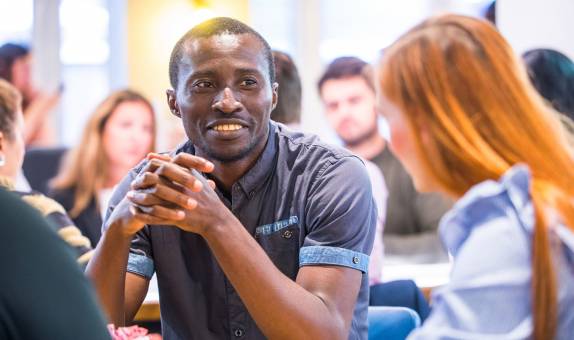
- Fees and funding
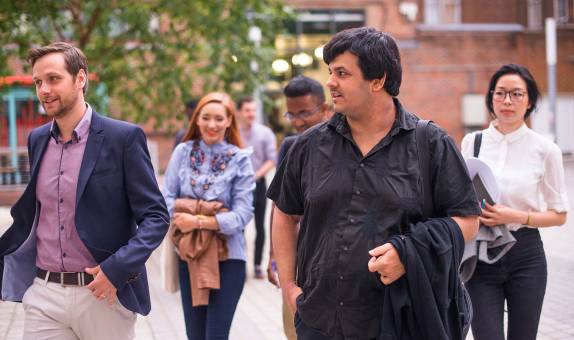
- Accommodation
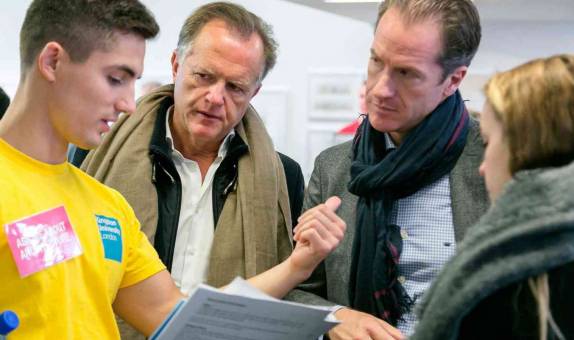
- Open Events

- Work placement
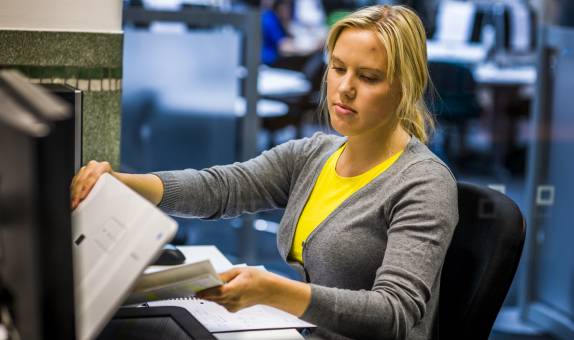
- Study resources
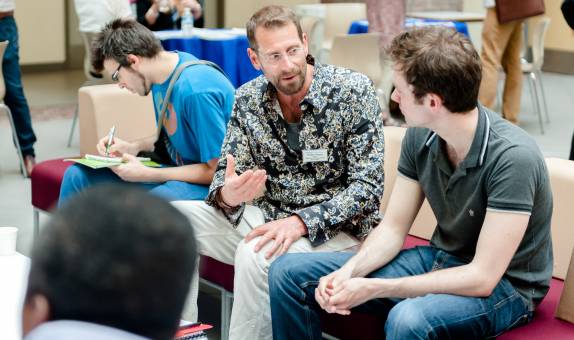
- Student support

- Choose Kingston
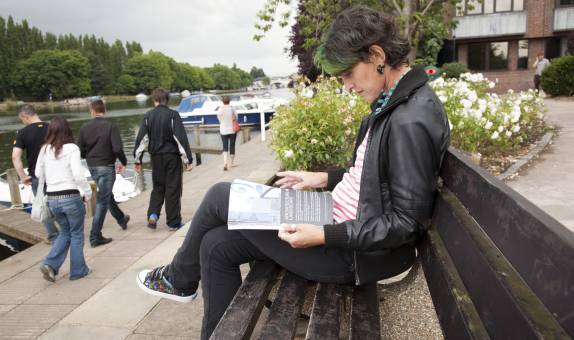
- Disability and mental health support
- Website accessibility
- Website feedback
- Freedom of Information
- Wider Information Set
- Privacy Notice
- Charitable status
Kingston University , Holmwood House, Grove Crescent, Kingston upon Thames KT1 2EE . Tel: +44 (0)20 8417 9000
Cookie Consent
To improve the website, the DAAD and third parties set cookies and process usage data . In doing so, the DAAD and third parties transfer usage data to third countries in which there is no level of data protection comparable to that under EU law. By clicking the "Accept all" button, you consent to this processing. You can also find selection options and explanations of these cookies and processing at the end of this page under "Cookies". There you can withdraw consent at any time with effect for the future.
- Privacy Policy
Jump to content
Work placements

Many students take advantage of work placements to gain initial professional experience while they are still studying. This experience helps them choose new areas of specialisation in their studies and makes their later entry into the world of work easier.
Why is a work placement worthwhile?
Work placements are considered an excellent opportunity for German and international students alike: they familiarise students with everyday working practices in Germany and help them build contacts to potential employers. Work placements are mandatory in many degree programmes. In these cases they are supervised by university teachers. Courses of study such as medicine even require a work placement for admission .
What kinds of work placements are there?
Work placements are available almost everywhere: with companies and organisations, at research centres and public institutions. Sometimes they last just a few weeks, sometimes several months. Whether to complete a voluntary work placement is up to each individual student; many subjects however include mandatory work placements . Work placements are also open to people who are not attending university.
What defines a good work placement?
Work placements don't always deliver the insights you hope for. That's why it's important to determine during the placement interview whether some important requirements are met.
- Standards: The tasks should be complex and challenging. You should have the opportunity to learn, ideally on a project of your own. That means: not entering data or making coffee all the time.
- Independence: After an introductory phase you should be able to work independently (with occasional help) on your project. If you manage to competently carry out your tasks, you will convince the company of your qualities.
- Duration: A work placement should be long enough to take on complex tasks. Two or three months are usually sufficient.
- Contact: You need a specified contact during your placement with whom you can discuss your work regularly.
- Payment: Some companies pay students on placement a monthly compensation, while others do not. If you feel you will benefit from the practical experience, you should choose the work placement even if it does not pay well.
What are the legal requirements?
The same legal regulations as for student side jobs also apply to work placements. Work placements are considered regular work, even if they are unpaid. If you are not from the European Union or the European Economic Area, you are permitted to work for up to 120 days a year. If you work more than this, you will need a permit from the Ausländerbehörde (foreigners' office) and the Agentur für Arbeit (Federal Employment Agency). More information is available here . Excepted from this rule are work placements that are covered by the study regulations for your degree programme (mandatory work placements).
How do I find a work placement?
If you are looking for a work placement, you should first consider what direction you want your career to take. A work placement allows you to try out interests, skills and knowledge from your degree programme in practice. Once you have determined your aims, the professional fields in which you want to work will usually also be clear. Then you can search the appropriate online job exchanges or look through the work placement exchange of your higher education institution for vacancies.
How do I apply?
It is important to contact the company directly before applying. A quick phone call to the specialist or HR department can answer important questions: In what areas are work placements available? How do I apply? What can students on placement expect? Then you can better tailor your application and have already gained a contact.
Your application documents should include:
- ... an individual cover letter to a personal contact.
- ... a clearly laid out CV.
- ... school and university certificates.
- ... employer references.
- ... possibly work samples.
- ... possibly a letter of recommendation.
What do I need to know for the interview?
If your application was good, you may be invited for an interview. The purpose of this interview is to find out whether the needs of the company and your expectations match. You can consider a few things beforehand: Why do you want to work there? What makes you a good choice for the placement? What are your expectations? If you have made it as far as the interview, you have a good chance of getting the work placement.
How much will I be paid?
Germany has a minimum wage of currently 12.41 EUR per hour since January 2024. Even students may not be paid less than the minimum wage, although this does not always apply for work placements. The minimum wage does not have to be paid for mandatory internships, and only has to be paid for voluntary work if the work placement lasts longer than three months. Otherwise, students on work placements are usually paid very little or nothing at all. In some cases a scholarship may be an option.
Deutscher Akademischer Austauschdienst e.V. Kennedyallee 50 53175 Bonn
All addresses in the DAAD Network
DAAD Newsletters
Receive regular up-to-date information about our work and organisation.
Newsletter - DAAD
Useful Links
- Find Scholarships
- DAAD offices worldwide
Jump to top of page
Unable to find any suggestions for your query...
The Essex website uses cookies. By continuing to browse the site you are consenting to their use. Please visit our cookie policy to find out which cookies we use and why. View cookie policy.
Masters with professional work placements

Gain a competitive edge
We’re giving you a unique opportunity to gain professional work experience within an external business or organisation of your choice, as part of a two-year Masters degree at Essex.
You can choose from four of our carefully selected Masters with Professional Placements courses listed below. Each course is an opportunity to put taught skills into practice and develop a network of industry professionals. Your placement is a sought-after contribution to your employability, giving you the tools employers look for in skilled graduates.
If you're interested in a degree with real-world practical value and you’d like to apply your academic knowledge to a working environment, then this is the course for you.
Professional placements will give you a fresh perspective of the world and your subject.
- Build relationships with key contacts in the industry you’re studying.
- Develop your skills through real work placements.
- Gain a competitive edge by combining theory and practice with real industry experience.
How does it work?
We’re offering two year postgraduate courses with an integrated professional work placement module in the second year. These courses are available to UK, EU and international students. The placement module will take place after the taught portion of your programme in year one and assessed as part of the course.
The courses are marked on the results of your written examinations, together with continual assessments of your practical work and coursework.
We'll assign you to an Academic Supervisor within your chosen department and a Placement Supervisor. Both of your supervisors will have regular contact with you throughout the work placement to make sure you get the most development from it.
Which courses offer professional placements?
- MA Curating with Professional Practice and Professional Placement
- MSc Data Science with Professional Practice
- LLM International Commercial and Business Law with Professional Placement
- LLM International Trade and Maritime Law with Professional Placement
How much does it cost?
Visit our course pages to learn what the fees for the professional placement are, as this may vary from course to course. Fees will also increase for each academic year of study.
How do I find a placement?
We will offer you support in finding and applying for a work placement, but you will be responsible for securing one. You should be aware that masters with placement courses are rare at universities in the UK so it can be hard to find a suitable placement.
We recommend that you look at what types of placements are available from employers before you accept a place on our course.
If you’re unable to secure a placement or change your mind about doing one, you can start your dissertation earlier and complete your Masters in your first year.
- International students
If you an international student, you will also need to consider your Tier 4 visa and any restrictions you may have which would stop you undertaking full time work. Brexit and other external political conditions may also make it harder for international students to secure a placement.
What are the benefits?
- The opportunity to bridge the gap between academic preparation and the demands of a real work environment
- Integration with an industry placement will give you the knowledge, skills and practice which will mark you out as a highly desirable candidate with prospective employers
- You'll be able to meet and build relationships with key contacts within the industry and work alongside highly experienced professionals
- Regular meetings with your Departmental Academic Supervisor and Placement Supervisor will help you gain the most from your placement
- Enhance your understanding of the job market by finding the key drivers within organisations that can effect decision making and advancement as an employee
- Support to develop a professional Curriculum Vitae (CV) to help you to apply for work placement interviews with employers
- Your placement work log will provide evidence to note the challenges you face and the problems you solve in a work based environment

Example course structure
The structure of the course will include the taught modules of your chosen MA in the first year, followed by the work placement module in the second. The dissertation module will be at the end of year two.
If you change your mind and decide not to do your placement in the second year, you can start your dissertation early and complete the Masters in the first year.

Sign-up to learn more about postgraduate study at Essex with emails about funding, facilities, accommodation, careers support and more.

- Course Finder
- Undergraduate study
- Postgraduate study
- Short courses and CPD
- Study online
- Apprenticeships
- Summer Schools
- Essex living
- Essex Sport
- Colchester Campus
- Southend Campus
- Loughton Campus
- Student facilities
- Student services
- Research excellence
- Research showcase
- Media requests
- Research Excellence Framework (REF)
- Research institutes and centres
- Departments
- How to pay your fees
- General - [email protected]
- Undergraduate - [email protected]
- Postgraduate - [email protected]
- +44 (0) 1206 873333
- University of Essex
- Wivenhoe Park
- Colchester CO4 3SQ

- Accessibility
- Our privacy statements
- Our transparency return
- Modern slavery and human trafficking
A guide to social work field experience
Fieldwork is an important component of the social work degree. While traditional coursework gives you an idea of the types of situations you may encounter in your work, there is no substitute for practical real world experience.
In your field placement, you will have the opportunity to put the skills you are learning into practice while receiving guidance from an experienced supervisor.
- Field placement requirements
What to expect
Finding your placement, where will i work.
- Associated costs
- Field placement supervision
- Required documentation
Field placement requirements
Accreditation .
In most states, to become a licensed social worker you must graduate from a social work program that has been accredited by the Council on Social Work Education (CSWE) . The CSWE has set a minimum number of field education hours that a student must complete in order to receive their social work degree from an accredited institution.
In March of 2020, the Council on Social Work Education (CSWE) modified their field placement requirements to allow for increased safety protocols for faculty, students, clients, and staff in light of the pandemic. In October of 2020, the CSWE extended these modifications through 2022.
BSW requirements
Pre-pandemic, CSWE-approved bachelor of social work field placements required a minimum of 400 hours to be completed on-site. Current protocol allows for students to reduce this by up to 15 percent, to 340 hours. The new protocol also allows for a possibility of remote work. Be sure to carefully investigate how the programs you are applying to are handling the situation, as each program will have their own way of adapting to these guidelines.
The BSW placement is considered a foundation placement. This means that rather than focusing on targeting skills that can be used with a specific population, your placement will focus on building a general foundation of skills that can be used with a broad range of clients and across multiple settings.
MSW requirements
Pre-pandemic, CSWE approved master of social work field placements required a minimum of 900 hours to be completed on-site. Current protocol allows for students to reduce this by up to 15 percent, to 765 hours. The new protocol also allows for a possibility of remote work. Again, be sure to carefully investigate how the programs you are applying to are handling the situation, as each program will have their own way of adapting to these guidelines.
The MSW program consists of 2 field placements. The first placement is typically shorter. It is the equivalent of the 400 hour BSW foundation placement described above.
The second placement is typically longer, and specialized towards your professional interests. It is here you will build on the foundational skills from your first placement and hone the skills you will need in your chosen field.
Advanced standing requirements
If you have your bachelors degree in social work and are pursuing your masters degree, you might choose an advanced standing social work program. The advanced standing degree gives you credit for your BSW and waives a significant portion of the masters program, up to an entire year. Most advanced standing programs give you full credit for your undergraduate field placement if you are coming from a CSWE accredited school. In this case, you will only have to complete the specialized field placement defined above.
Accelerated requirements
Students pursuing an accelerated MSW program are committing to complete the same amount of work as a student in a traditional MSW program in a shorter amount of time. This includes fieldwork. Accelerated MSW students will have to complete both a foundation field placement and a specialized field placement with the same number of hours as their traditional counterparts.
State requirements for clinical licensure
If you are planning to pursue clinical licensure after graduation , your requirements for post graduate supervised clinical experience will vary by state. Some states will closely examine your graduate field placement work as well. If your field placement hours do not include enough clinical contact, some states will increase the number of post-graduate clinical contact hours needed to apply for licensure.
For example, Maine doubles its requirements for clinical experience for applicants who do not have a clinical field placement in their masters program. Wisconsin adds an additional 1,500 hours of clinical experience requirements for applicants without a clinical field placement.
To ensure you will get the most out of your field experience, you should get a detailed picture of how the process works at each of the schools you are considering.
Some questions to consider:
- How large is the fieldwork department?
- Are students assigned to individual field advisors?
- How many credits of field education are required?
- What are the academic requirements for field education?
- How are field placements obtained?
- Are there placements available with your area of interest?
- What protections are in place for the student?
- What recourse do students have if there is a problem with the field placement?
- Are there any paid opportunities?
- How often do students meet with their academic field advisors?
- Do the academic field advisors meet with the placement site supervisors?
- Does the field education office do site visits?
- Are virtual field placements available?
If your program matches you to your field placement, your journey will begin with the fieldwork office at your school. You will be asked to identify your career interests and field education goals through questionnaires and interviews.
An honest assessment of your skills will be important here. You want to be open about what you bring to the position as well as what you need to learn. You are not expected to be an expert when you enter the placement.
Some schools will require you to find your own fieldwork sites. Once you have found a match, you must then submit the proposal to your academic field placement office for approval. This can be a long process, so if the program you choose falls into this category, you will want to identify potential fieldwork sites as early as possible.
If your school falls into this category, ask if they have a list of placement sites and supervisors that they have worked with in the past, have access to databases of potential placement sites, or have a network of alumni who can help new students find appropriate placements.
Once your placement options have been identified, you will have an interview. Fieldwork is often considered to be the keystone of social work education, encompassing roughly one third of your entire educational program. You will be spending the equivalent of a part-time job there, learning your craft. So ask questions that will help you determine if the placement will provide you with everything you need.
Some examples:
- What does orientation look like?
- Will you have the opportunity to shadow staff?
- What specific tasks will you be expected to/allowed to complete?
- How are those tasks assigned?
- What resources are available to students?
- What can you expect the workload to look like?
- How often will you meet with the supervisor?
- Will your placement include virtual services? i.e. telehealth
- Will your immediate supervisor be a social worker? Will you have enough hours of MSW supervision to meet your requirements for your program?
- What type of documentation will be provided to your school?
- How do they monitor and evaluate students? What do they expect from students?
- Will you have the opportunity to complete all of the tasks required for your field placement?
Foundation placement
Your first placement will be a foundation or generalist placement. This placement provides students with a strong grounding in basic social work skills, practices, and philosophical approach that will apply in any future placement and work setting. Students are exposed to multiple social work roles, including case management, advocacy, resource management, assessment and discharge planning, etc.
Ideally, the foundation year field placement will provide students with opportunities to develop what the Council on Social Work Education calls the nine social work competencies: ethics, diversity, research, policy, human rights and social, economic, and environmental justice, and direct practice skills including assessment, engagement, intervention, and evaluation. This placement may not be in the student’s preferred area of practice, but instead will offer a wider array of experiences.
An example of a foundational fieldwork placement in a hospital might include the following:
- Assessment and discharge planning
- Case management
- Interdisciplinary teamwork
- Community resource management
Specialized placement
After completing the foundational field placement you should feel more confident in your abilities, and have a level of comfort and confidence with the core competencies. You will then be ready to pursue your second year, specialized field placement. Here you will build on these foundational skills and add training in the skills targeted to your specific career interests.
An example of a specialized macro field placement with a NGO might include the following:
- Public health
- Social justice
- Campaign design
- Program development
- Community outreach, assessment and engagement
- Liaison i.e. between communities, organizations, and government
For a deep dive on the distinctions below, check out our complete guide to the different levels of social work.
Micro
- Rehabilitation Center
- Community Mental Health Center
- Medical Practice
- Probation/Parole Office
- Foster Care
- Senior Living Facility
- Childcare Center
- Homeless Shelter
Mezzo
- Community Based Organizations
- Advocacy Groups
- Immigration Services
- Refugee Services
Macro
- Government Agencies – all levels
- Human Rights Agencies
Professional social workers have incorporated virtual technologies into their practice for many years. The National Association of Social Workers ( NASW ) has devoted a section of their code of ethics to the use of technology in social work practice.
With the advent of the pandemic in 2020, fully virtual placements became more common. These days it is likely that a field placement will include at least some virtual elements. Be sure to inquire about this in both your interview with the school prior to admission and with your field supervisor during the interview process.
Some schools offer a fully virtual field practicum for their first year placement. This format uses technology to place students in simulations of the situations they would encounter at a traditional foundation field placement site. Faculty, other students, and sometimes actors take on the roles of clients and staff, while faculty observe and instruct the students in real time.
Field placements are a part of the social work curriculum. On average, field education credits make up about a third of the total course work in a social work program.
At first glance, this can seem exploitative, using the student not only as free labor, but going even further and making them pay to work. However, this should not be the case. A good field placement will offer hands-on education. It provides an opportunity for students to observe and engage in practical situations that will prepare them to work independently as a social worker.
The tuition for field education covers much more than work experience. Ideally, along with the time you are putting in at your placement agency, your tuition will cover access to field placement staff support. The field education office should be assisting you with finding a placement that is a good fit. They should be checking in with you and your supervisor on a regular basis. And there should be at least one site visit per semester.
Your field education coursework will also include seminars where you will be discussing your placement with an instructor and other students. Your professor will be providing guidance as well as reviewing the papers and projects needed for successful completion of your placement.
In other words, your tuition should be paying for more than just the hours you are putting in at your placement site.
However, if you want to be compensated for your time, there may be some opportunities available to you. Some schools provide stipends, and some agencies do offer paid placements. It will be up to you to seek out these opportunities, so be sure to ask about this during your application process and during the field placement selection process.
Supervision
While you may not find a placement that is an exact match for your interests, a good supervisor will ensure that you get the most out of the experience.
Your supervisor’s job is to train you so that you can gain the skills and confidence to be a professional social worker. You are not expected to know everything when you get there.
Your field supervisor will do more than help you hone your skills. A good supervisor will educate you on how to incorporate your social work competencies and subjects from your classroom learning into your work. They will provide opportunities for observation and education.
Your supervisor should also work with you to process your experience. Social work can be an emotionally demanding profession, and this can be difficult to navigate. Your supervisor should provide you with opportunities for self-reflection and self-care.
If your field supervisor does expect you to be an expert, or expects you to jump in and act as staff from the start, don’t take this as a compliment. You are not unpaid labor. You are there to learn.
You should never be made to feel like a burden. As time goes on you can and should be able to take on more responsibility, but you should also be supervised and should always feel comfortable seeking supervision.
If you are having trouble with your supervisor, address it with your academic field office ASAP. If you are worried that you will not be able to complete your course objectives, if you feel exploited or ignored or harassed or abused, your field education office should be able to help you resolve the situation, or find a new placement if necessary.
Documentation
As you have seen, there are many field education requirements to be met. The Council of Social Work Education has requirements. The school has requirements. The placement site will have requirements. Good documentation will be key to ensuring that you are on track to meet all of your obligations.
Each program will have its own contract or agreement that the student and placement supervisor must review and sign prior to beginning the practicum. Be sure to fulfill your part of the contract, and hold your supervisor to their part.
The contract should set out a detailed outline of the responsibilities, rights, and risks for both the student and the field supervisor. It should include specific tasks, knowledge, skills and abilities. Most importantly, the contract should provide accountability for both the student and the supervisor.
Fieldwork is considered to be the cornerstone of social work education. More than anything else, it is your field experience that prepares you for a successful social work career. Ask questions and advocate for yourself throughout the process. From the moment you begin to consider educational programs through the process of finding a placement site and interviewing with your potential supervisor, you have the opportunity to find a placement site that meets your needs.
When you get there, take advantage of every opportunity that comes your way. Make the most of your supervision sessions by asking questions. Accept the feedback you receive. Learn how to apply the knowledge you have learned in class to a real world setting. At the end, you will have the skills and the confidence to pursue your social work career.

Work Integrated Learning
Complement your studies with valuable work experience and career readiness supports. Get paid or earn course credit – plus essential, in-demand employment skills and experience in your field – with a variety of work integrated learning experiences. These opportunities allow you to network within your chosen field and develop valuable work experience while also putting theory into practice.
Use the search below for work-integrated learning opportunities by academic department.
Quick Links
- Career Readiness Supports
- Work/Study Programs
- Scholarships, Awards and Bursaries
- Study Abroad
- LA&PS Co-op Program
- Dean's Award for Research Excellence (DARE)
- Career Centre
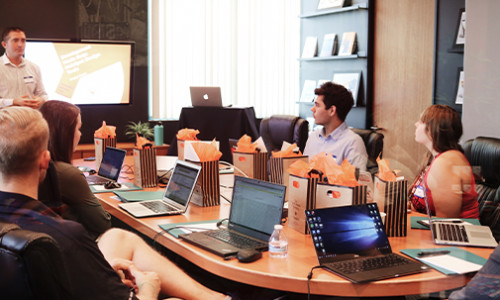
Applied Marketing Management
ADMS 3220 3.00
Students analyze marketing problems and develop solutions to real-world situations. Course components include: situation analysis, segmentation, targeting, positioning, marketing strategies, evaluation and control.

Applied Public Policy Analysis
PPAS 4200 6.00
An applied analysis of specific areas of public policy chosen to reflect current public debates. Students apply their knowledge of policy analysis in the context of case studies and/or real world projects with community partners.

Bachelor of Social Work Practicum
Placement Course SOWK 4000 6.00 & SOWK 4001 6.00
The School of Social Work seeks to prepare students to be critical practitioners and agents of change. As part of this preparation and as a requirement for graduation, each student completes a field practicum. The practicum is intended to support the integration of theory and practice, preparing students to function as professional social workers. As such, the field practicum becomes the culminating experience of each student's education at the School.

Black Canadian Studies Practicum
Placement Course HUMA 4305 6.00
This course provides students with practical experience analyzing issues through the lens of Black Canadian Studies with placement in the offices of elected officials.

CCY Work-Focused Placement Course
Placement Course CCY 4900 6.00
This course provides hands-on, Work-Focused EE opportunities to fourth-year Children, Childhood & Youth students. Students complete part-time, supervised placements with non-profit or community organizations to gain relevant work experience in exchange for academic credit.
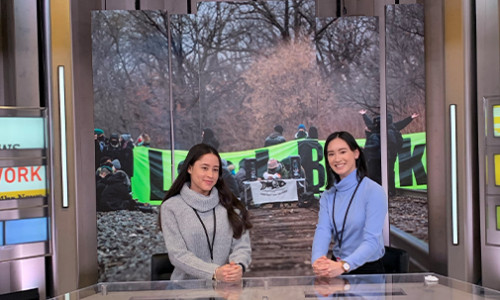
Communications Field Experience: Corporate and Cultural Industries
Placement Course CMDS 4140 6.00
Take your studies out of the classroom and apply the skills you’ve learned in a real work situation! Available to all fourth year Communication & Media Studies, this course allows students to apply for an unpaid position within an organization and work part-time for academic credit. Students recieve hands-on experience, opportunities to network with people working in the communications sector, and insight into different career pathways.

Criminology Placement Course
Placement Course CRIM 4667 6.00 (Crosslisted to SOSC 4667 6.00)
The purpose of this course is to provide students with an opportunity to develop their knowledge of criminological issues and approaches in a practical context. The course begins with in-class workplace-related skills training followed by placement in a government, community, or non-governmental organization working with people in conflict with the law, victims of crime, or in crime prevention. Application required.

Cross-Campus Capstone Classroom (C4)
Interdisciplinary Capstone Project
Come together and join upper-level students from across York to work together in multi-disciplinary teams to solve real-world challenges. Challenges are posed by organizations from both the for-profit and not-for-profit sectors.

Digital Authoring Practicum
Placement Course WRIT 4001 6.00
This practicum allows fourth year students in PRWR to design and implement online writing and marketing campaigns for community organizations. Community service learning is central to this course. Students are matched with individuals and organizations that need digital help. Students write blogs, build websites, execute social media campaigns, write and design material appealing to multiple audiences using a variety of technologies. Students critically reflect on issues related to online communication.

Doing Culture: Narratives of Cultural Production
Placement Course CLTR 3150 6.00 (Crosslisted to HUMA 3207 6.00)
Offers students opportunities to engage with the local cultural sector in order to better understand the relevancy of cultural organizations in a multicultural city. The course explores cultural relationships, combining theoretical and experiential components in a blended learning environment where students hone transferable skills and develop professional contacts.
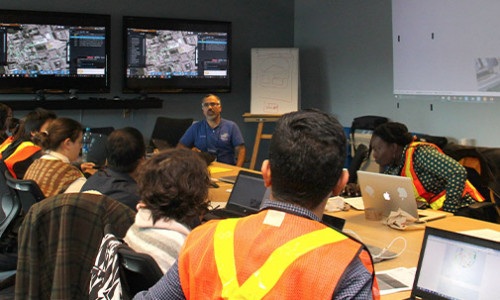
Emergency Management: Field Experience
Placement Course DEMS 3705 3.0
Apply theories of emergency management and gain work experience through a part-time placement opportunity with a variety of organizations within the private, public and NGO sectors. Students will complete 12 hours of placement per week over 11 weeks (132 hours).

Engaging Health in the Community
Placement Course SOSC 4144 6.00
This course applies academic knowledge of health, health advocacy, and health care systems to experience in community settings through classroom study and the application of social science research methods in student placements in health-related organizations and agencies.

English Honour Thesis/Work Placement
Independent Study EN 4099 6.00
Provides an opportunity for sustained research under the direction of a member of the department on topics not covered in the English curriculum. The research may take the form of either a thesis or a work placement.

Foreign Language and Digital Media: Developing Skills for Online, Spanish-English Publications
Capstone Course SP 4990 3.00
In this capstone course, students engage in high-impact Community Focused Experiential Education. Activities focus on writing, researching, editing and publishing works for an online university undergraduate magazine.
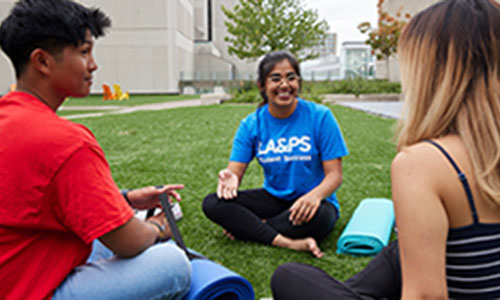
HREQ Work-Focused Placement Course
Placement Course HREQ 4460 6.0
This work-focused, course-based placement provides HREQ majors with an intensive experiential education opportunity in their fourth year in exchange for academic credit. Participants will apply their skills and knowledge in the area of human rights and equity as they work with community organizations, government agencies, non-profit agencies, or other relevant groups.
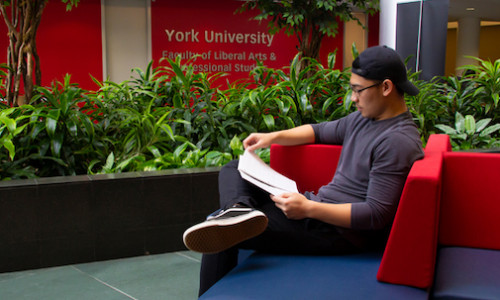
IBM Learning Space
Students in certain LA&PS undergrad, graduate and master’s programs have the opportunity to study at our state-of-the-art Learning Space in IBM Canada’s headquarters – a high-profile and dynamic environment populated by academic researchers, entrepreneurs, start-ups and developers.

International Development Placement Course
Placement Course SOSC 4605 6.00
This course allows students to combine learning about the workings of development non- governmental organizations, through a hands-on experience with an NGO and more conventional academic activities in the classroom. The unpaid work placement will be fulfilled with an NGO involved in international and/or local development within the Greater Toronto Area.

International Refugee Protection Regime II
PPAS 4112 3.00
Students will conduct independent research on international asylum and refugee issues and will have an opportunity to consult with an organization working with refugees.

Italian for Professional Purposes
Placement Course IT 4500 6.00
This course offers a unique opportunity for the students of Italian to develop advanced language competency, with a focus on formal registers of Italian for professional purposes. In addition to earning academic credits, students will gain hands-on work experience, while using Italian in a variety of course-based placements in profit and non-profit organizations in the GTA.

LA&PS Internship Program
Test-drive a career and get paid, hands-on, full-time work experience for a period of 4, 8, 12, or 16 months. The LA&PS Internship Program is open to all full-time undergraduate students enrolled in an Honours undergraduate degree who meet the eligibility requirements of their academic program.

Labour Studies Work Placement
Placement Course SOSC 4240 6.00
The purpose of the course is to provide students with first-hand experience regarding the different ways organizations pursue workplace improvements and broader social and political change for all working people. The course has both seminar (in-class) and placement (cooperative learning) components. The placement component of the course involves work directed by a supervisor (usually a staff person or leader of a union, community-based or social justice organization).

Marketing Live Client Learning
ADMS 4211 3.00
Work on real-life projects with companies and non-for-profit organizations, and participate in national case competitions through the Marketing Live Client Learning course.

Master of Social Work Practicum
Placement Course SOWK 5310 6.00 & SOWK 5350 6.00

Organizational Writing Practicum
Placement Course WRIT 4003 6.00
This practicum offers students direct experience applying rhetorical theories and concepts to writing for businesses/organizations requiring new or improved documents, newsletters, promotional literature, etc. Students develop client relationships with the York community (internal and/or external) while performing needs assessments, developing proposals, planning, producing, editing and publishing materials, and managing delivery in both print and digital media.
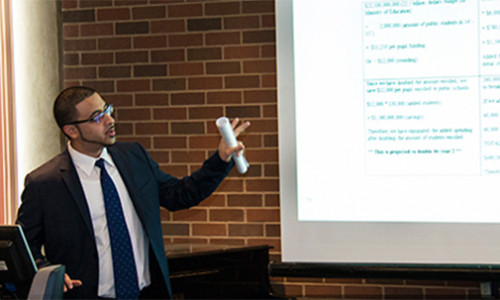
Practicum in Public Administration
Placement Course PPAS 4995 6.00
Public policy and administration students in their fourth year may register for this placement course, which combines volunteer work experience in an agency with an academic analysis of that experience. Enrolment is by permission only and permission will be granted only in September depending on the number of placements available and the competitiveness of the student pool.

Practicum in Teaching English to Speakers of Other Languages
Placement Course TESL 3300 6.00
The course provides an experiential education opportunity to put theory into practice, integrating blended online and in-class instruction alongside placement at a variety of English as a Second Language (ESL) instruction settings. Students complete 50 practicum hours (30 hours observation and 20 hours practice teaching).

Program Evaluation I & II
PPAS 4310 3.00 & 4320 3.00
Provides students with a variety of methodological tools and case study practice necessary to effectively carry out the evaluation studies of government programs and public policies. Students will have an opportunity to undertake assessments, put research designs into practice for formative evaluations, summative evaluations and needs studies.
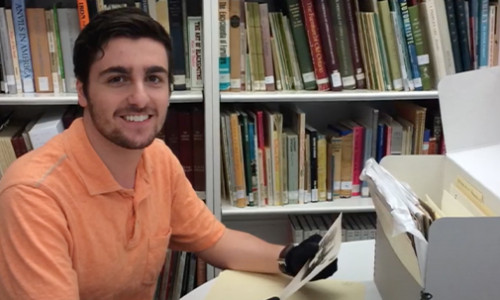
Public History
Placement Course HIST 4840 6.00
This course examines the forms, goals, and practices of making history in museums, archives, historic sites, and other institutions of public history. It enables students to learn the meaning and methods in the production of memory and introduces them to the practical skills for the public presentation of historical knowledge. The course combines analytical study with a part-time placement in a public-history site.

Research Seminar in Economics
Research Seminar ECON 4089 3.00
This course assists students in developing strong analytical, quantitative, and communication skills through independent research and by working in collaboration with a partner organization. It familiarizes students with some of the major issues and research approaches in economics through discussions and presentations of various topics.
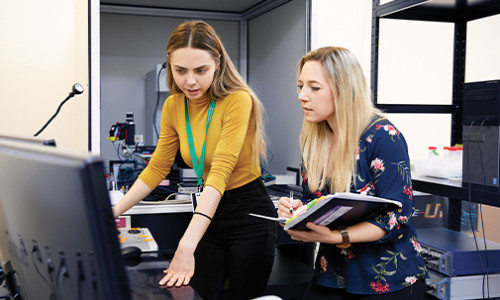
Social Economy Practicum
Placement Course SOSC 4046 6.00
Take your studies out of the classroom and apply the skills you’ve learned in an real work situation! Typically taken in fourth year, the Social Economy Practicum course allows you to apply for an unpaid position within an organization and work part-time for course credit. Students receive hands-on experience, opportunities to network with people working in your chosen field, and insight into different career pathways.

Sociology Field Placement
Placement Course SOCI 4100 6.00
This course places sociology students in not-for-profit, government, and community organizations in order to gain experience and skills in workplaces that respond to social inequalities. In addition, the students will meet regularly in a seminar setting to reflect upon their experience, and connect it to their sociological training.

The Professional Anthropologist: The Anthropologist as Practitioner
Placement Course ANTH 4130 6.00
This course combines analytical study with a part-time placement in a non-governmental partner agency. Students will complete around 176 hours of placement over 8 months.

Urban Field Experience
Placement Course SOSC 4710 6.00
This course involves students in work with an organization engaged in some aspect of urban development or administration. Students commit one day a week (or the equivalent) to projects defined by a public or private agency in or near Toronto. Each student’s work is supervised by a staff member of the agency and is monitored by the course director.
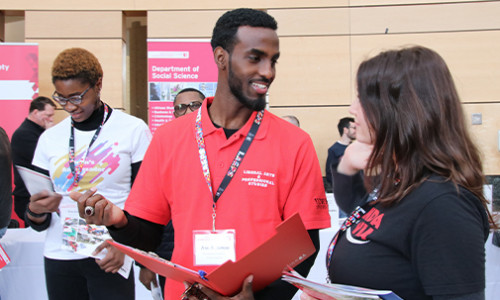
Work/Study Program
The Work/Study Program at York is an excellent way for undergraduate students to gain a paid, work-integratred learning experience on campus.
Connect with LA&PS
We've introduced a new AI-powered search function on our website. We hope you find it useful. The system will learn as website visitors add searches... so please give it a try.
What are you looking for?
- Courses with Work Placement
- International
Relevant work experience while you study
With two-thirds of employers looking for graduates with relevant work experience ( UCAS ), you can boost your long-term employability by taking the option of a paid work placement.
Undergraduate courses with work placements
Work placements are available on many of our undergraduate programmes. To find out more about placement opportunities in the courses you are interested in please go to the course pages for more detail.
Postgraduate courses with work placements
Work placements are available on the following courses (check the course page for intake with placement option):
- Accounting and Finance MSc
- Advanced Design and Manufacturing MSc
- Computing MSc
- Financial and Investment Analysis MSc
- International Hotel Management MA
- International Marketing Strategy MSc
- International Tourism Development MA
- Logistics and Supply Chain Management MSc
- Master of Business Admistation MBA (with Placement)
- Project Management MSc
Explore Our Campus

Science Work Placements

School WIL courses allow students to gain genuine work experience in a science or technology-related workplace via a work placement and gain elective credit towards their science degree.
A work placement is a core component of Science WIL courses, alongside professional development assessments. These are designed to prepare for a professional work environment and get the most out of your placement. Science WIL courses are credited towards your science program as a science or free elective. The work placement must be related to your science major. The courses are offered in all academic terms, including summer.
Find out more about the new WIL model: https://unsw.sharepoint.com/sites/Science-Student-Opportunities Note: The above link is only accessible to current UNSW Science students and staff
Further information
Science work placements will improve your practical skills and confidence and you’ll gain genuine insights into your future career. Find further information on the program below.
Science WIL Placement courses enable undergraduate science students to apply their disciplinary knowledge and transferable skills in a professional context, through a work placement experience at an organisation external to UNSW. Students will have the opportunity to develop key professional skills that align with their career goals and contextualise their field of study in a professional workplace setting.
The main component of the course is a work placement related to the student's field of study. The placement can be paid or unpaid. This supervised workplace experience is supported by professional development and discipline-specific modules that students can select from, in line with their individual career goals.
The courses will count as a science or free elective and is graded on a satisfactory/unsatisfactory basis.
The core work placement may vary in length and intensity depending on the enrolment pattern chosen:
- Option A: minimum 105-hour placement completed in 1 term (worth 6 UOC)
- Option B: minimum 210-hour placement completed in 1 term (worth 12 UOC)
- Option C: minimum 210-hour placement completed over 2 terms (worth 12 UOC)
Example: BABS3199 BABS Work Placement 1 and BABS3299 BABS Work Placement 2

Science WIL Placement Courses currently available:
Students should select the WIL Placement Option relevant to their specialisation or major of study.
- Aviation WIL Placement Courses: AVIA3199 and AVIA3299
- BABS WIL Placement Courses: BABS3199 and BABS3299
- BEES WIL Placement Courses: BEES3199 and BEES3299
- Chemistry WIL Placement Courses: CHEM3199 and CHEM3299
- Materials Science WIL Placement Courses: MATS3199 and MATS3299
- Medical Science WIL Placement Courses: SOMS3199 and SOMS3299
- Physics WIL Placement Courses: PHYS3199 and PHYS3299
- Psychology WIL Placement Courses: PSYC3199 and PSYC3299
- Science WIL Placement Course: SCIF3199 (for special programs only, and by invitation only)
Students who studying a program or major in the School of Mathematics and Statistics should contact [email protected] for information on how they can complete a WIL Placement.
Vision Science majors are currently excluded from Faculty of Science Work Placement courses.
Enrolment is subject to approval and completion of required pre-requisites.
Permission to enrol will only be granted if the student:
- Is completing a relevant major or specialisation for the WIL course/s they are applying for.
- Has secured a supervised work placement compatible to their major of study, which has been reviewed and approved by the School.
- Has completed the required pre-requisites (48 units of credit, minimum 65 WAM, passed pre-requisite Preparation for WIL modules).
Please note:
- The course is only available to students who are commencing a new work placement compatible to their major of study. Students seeking to enrol with paid or unpaid work they are already undertaking outside their studies will not be considered.
- Students are required to experience a job hunting/recruitment process and secure a relevant work placement prior to seeking approval for enrolment. Work placements are not provided for students.
- It is the student’s responsibility to check if they have space in their program for this elective.
- This course cannot be taken during an Honours year.
Students must have their work placement approved and enrolment finalised before their work placement starts.
Students must also meet the standard UNSW enrolment deadlines.
During a work placement, you will be working as an intern at an external organisation. The work you will do will be related to your specialisation or major of study, and you'll also work on key transferable skills relevant for any workplace such as communication, teamwork and critical thinking. You will contribute productively to a project or series of activities set up by the organisation, and complete assessments alongside your work.
You build on your discipline-specific and transferrable skills, with guidance from a work placement supervisor and a UNSW academic coordinator.
The specific nature of your work experience depends on the organisation you are working for, but here are some broad examples.
- Interns may spend time shadowing members of staff in science-related roles, contributing in an assisting capacity to a range of activities.
- As an intern, you may be asked to be a team member on a project for the duration of the internship. It may be an ongoing project, or one that is completed during the internship.
- Interns may be assigned to an individual project that can be completed within the hours of the placement.
- Specific tasks may be largely office-based, including literature searches, data entry, preparation of figures for presentation or marketing materials.
- There may be also opportunities for hands-on laboratory work and field-based activities.
Your work placement experience is supported by coursework and assessments. This will help you to prepare for the workplace, develop your professional skills and reflect on your professional experience with your peers and course teaching staff.
Students should consider this advice before confirming a placement and seeking approval for WIL Course enrolment. Please contact [email protected] if you have further questions.
Local placements
Working arrangements are permitted if they satisfy the following conditions:
- The placement is consistent with Government directives and guidelines relating to travel, social distancing and hygiene measures.
- The placement meets standard Science WIL Course requirements.
If the placement is conducted remotely (the student is required to work from home), additional safety parameters must be followed:
- Students will complete a workplace safety assessment prior to receiving approval to work at home.
- Students will ‘clock in’ and ‘clock out’ to maintain a real time record of their work hours.
- Students will only work between 8am to 6pm on workdays.
- Students will report any incidents of accident or injury within one business day.
International placements
International work placement experiences are open. International students currently residing in their home country are permitted to undertake a WIL Course work placement with an organisation in their home country. Past examples include the Paraguay Virtual Internships (Environmental Conservation) and Virtual Science Internships: Malaysia . Please contact [email protected] if you have further questions.
Students must apply for enrolment into a Faculty of Science WIL course. Applications will be assessed according to the eligibility criteria and suitability of the work placement.
There are two pathways for applying, based on how you secured your work placement:
- Faculty advertised work placements.
- Student sourced work placements.
Faculty advertised work placements
UNSW Science negotiates placements with employers and advertises pre-approved opportunities to students. These are advertised via email to relevant student cohort and the Current opportunities page. Application processes will mimic a real job application, requiring students to submit a Resume and Cover Letter as a minimum. Specific application requirements is provided for each Faculty advertised opportunity. If students are successful in securing a placement, they will be contacted with further instructions on how to apply for enrolment approval.
Student sourced work placements
Students approach employers to apply for placements and once secured, applies to UNSW Science for approval and enrolment. This is the most common form of sourcing placements, and students encouraged to be proactive and search for opportunities relevant to your career goals. Work placements must be related to your major of study. Each application will be assessed to ensure that the work placement is relevant.
Here are the steps normally taken by students sourcing their own placement:
Step 1: Research & networking
Start researching organisations to intern for.
Think about what sort of career path or industry interests you and what kind of organisation could offer this kind of experience. Undertaking the STEM Career Launchpad program will help you with this career planning process.
Also ask your fellow students, supervisors, family and friends if they know anyone you could contact within their networks. Try to find a connection within the area you are interested in.
Networking is very helpful when searching for work placement opportunities and when looking for work after you finish your studies. Make sure the organisation you approach for a placement will be able to provide an experience that is relevant to your Science degree and desired career direction. This page offers more detailed advice on how to approach organisations for a work placement.
Step 2: Provide information to your host organisation
Once you have made contact with an organisation or company, you should send them information for host organisations. This will let them know of what’s required as a host. If your internship host company has any questions you cannot answer, ask them to contact the Science Education Team via [email protected].
Step 3: Complete the recruitment process
Under most circumstances, there will be a recruitment process and you'll need to submit a written application and do a job interview. If you are successful and are offered a role, make sure your employer is happy to proceed with a WIL Placement course experience. It is very important that you discuss the WIL placement program with your employer (including your day-to-day supervisor) and have their permission to proceed with an application for a WIL course.
Step 4: Approval
You must apply to UNSW Science for approval. We will assess your application according to the eligibility criteria and suitability of the work placement (remember - your placement must be directly related to your major of study).
Please contact [email protected] for details on how to apply.
If you have any questions about the suite of Science WIL Placement courses, please contact [email protected].
Contact us if you are interested in completing a WIL course.
Work placement and covid-19.
If you are considering undertaking a science work placement, please:
- read the 'Work Placements and COVID-19' update
- contact the Science Industry team before finalising any work placement opportunity.
FOR STUDENTS
- Current Students Hub
- Support Services
- International Students
- CAO Students
- NCI Support Hub
- Information Hub
HELP AND ADVICE
- How to Apply to NCI
- How to Find Us
- Student Help
- Jobs at NCI
- Frequently Asked Questions
FACULTIES AND DEPARTMENTS
School of business.
- School of Computing
- Cloud Competency Centre
- Psychology Department
- Centre for Education and Lifelong Learning
- Registrar’s Office
- Early Learning Initiative
- HR Department
- Marketing Department
- Student Services
- Quality and Institutional Effectiveness (QIE)

- All Courses
- About the MBA at NCI
- Why Choose NCI for your MBA?
- MBA Course Content
- How to Apply to the MBA
- MBA Student Profile
- Meet the Faculty of the MBA
- CIPD Courses
- ERF Recruitment Apprenticeship
- Become an IFS Apprentice
- Hire an IFS Apprentice
- International
- Undergraduate
- Postgraduate
- QQI Applicants
- Mature Students
- Transfer Students
- Disability Access Route to Education (DARE)
- Higher Education Access Route (HEAR)
- How RPEL is used in NCI
- How to apply under RPEL
- RPEL Supports in NCI
- Undergraduate Fees
- Postgraduate Fees
- Free Fees Initiative
- Mandatory Fees
- Direct Debit Plan
- Grants & Funding
- Student Assistance Fund
- Fund for Students with Disabilities
- Sports Scholarship
- Employer Sponsorship
- Contact Fees Office
- Springboard
- Application FAQs
- Postgraduate & Part-Time Prospectus
- Full-Time Prospectus
- Chat to Students
- Microcredentials
- Student Mail
- MyDetails Login
- Pay Your Fees
- Password Management
- Office 365 myApps
- Virtual Desktop
- Print Top-up
- Learner Protection
- Wifi Printing
- Eduroam Configuration Tool
- Azure Dev Tools for Education
- Academic Calendar
- Modules Descriptor
- Access Orientation
- Part-Time Registration and Orientation
- Springboard Registration and Orientation
- Skillnet Student Registration
- Returning Students
- Who is Eligible?
- Accommodation Location
- Student Accommodation
- Sports & Recreation Facilities
- Café & Restaurant
- Recreation Room
- Clubs and Societies
- Academic Operations
- Student Leaders
- Student Shop
- Academic Integrity
- Recognition of Academic Excellence
- Previous Research Projects
- Current Research Projects
- Book Chapters
- Conference Items
- Journal Articles
- Reports and Monographs
- ELI Research
- Intellectual Property
- Enterprise Ireland Innovation
- Research Day
- Psychology Research
- Why Choose NCI?
- President's Office
- Mission, Vision and Values
- NCI: 1951 to Present
- Distinguished Directors
- Dublin Docklands
- Your Yes Matters
- Annual Reports
- Financial Statements
- Quality Assurance
- Academic Policies & Procedures
- NCI Strategic Plan 2022-2027
- Gender Pay Gap Report
- Governing Body
- Awarding Body
- Athena Swan at NCI
- School of Business Faculty
- Dean's Welcome
- Computing Research
- Computing Project Showcase
- About the NCI Cloud Competency Centre
- Why Study Cloud Computing at NCI?
- Head of the Cloud Competency Centre
- International Advisory Board
- Research at the CCC
- Meet the CCC Team
- Courses in Psychology
- Meet the Team
- Why Study Psychology?
- Student View
- Postgraduate Programmes
- Early Childhood Education and Care
- Initial Teacher Education
- Programmes for Learning Professionals
- Teaching Enhancement
- Meet The Education Team
- Welcome Message
- P-TECH in Ireland
- Certificate in P-TECH
- Certificate in Educational Practice for P-TECH
- P-TECH Collaboration
- P-TECH Press Coverage
- Registrar's Office
- Exams Office
- Student Services Office
- Quality and Institutional Effectiveness
- Room Descriptions
- Terms & Conditions
- Culture of Research & Innovation
- Technology Transfer
- Terms and Conditions of Occupancy
- Previous Tenant Companies
- Mission & Vision
- ELI Fundraising Standards
- Advisory Committees
- Area-Based Childhood (ABC) Programme
- ParentChild+ Programme
- ABC 0-2.5 Years Programme
- Restorative Parenting
- ABC 0-5 Community Parent Support Programme
- Parenting 365 Pilot Programme
- Stretch Graduate Home Visiting Programme
- STEM Play & Learn (Summer Home Visiting Programme)
- Early Numeracy Programme
- Zoom Ahead with Books
- English Language Support Programmes
- Tuition Support
- STEM Stretch Family Learning Programme
- Robotic Coding Club
- Stretch to Learn Programmes (NCI Challenges)
- Educational Guidance Programme
- Discover University
- Third Level Internship
- Síolta and Aistear
- Mentoring Support Programme
- Restorative Practice
- Corporate Support
- Make a Donation
- Corporate Volunteering
- Publications
- ParentChild+ National
- Home from Home Programme National
- Home Visiting Alliance
- My Place to Play National
- Sláintecare Community Mothers Programme
- Rethink Ireland Innovate Fund
- ELI Research Projects
- A - Z Staff Directory
- Lecturer in Computing
- Associate Faculty | School of Computing
- Assistant Professor in Psychology
- Assistant Professor Marketing/ Sustainability/ Strategy
- Associate Professor in Education
- Latest Updates
- COVID-19 Update
- Car Parking
- A-Z Page Listing
Courses with Work Placement
Find out which business and computing courses include work placement as part of its syllabus below.

Students enrolled in one of the below programmes can complete a placement year between the second and third (taught) years of the course:
- BA (Hons) in Business
- BA (Hons) in Accounting and Finance
- BA (Hons) in Marketing Practice
- BA (Hons) in Human Resource Management
The work placement is a formal and academically accredited element of the degree programme, is graded and worth 60 credits . Those students who successfully complete the placement module graduate with a 4year 240 credit award rather than a 3 year 180 credit award. Officially the placement is due to commence in September for a minimum of 8 months or 33 weeks. Students can start the placement earlier (from June) and complete an 11-12 month placement if both parties are in agreement. Students return to their fourth and final year the following September.
*Students can start the placement earlier (from June) and remain in employment until the following September if both parties are in agreement.
School of Business Work Placement Programmes
school of computing.
Undergraduate students studying the below courses will undertake a compulsory 30 credit work placement in the second semester of their third year:
- BSc (Hons) in Computing
- BSc (Hons) in Technology Management
The placement commences in January/February for 6 months minimum (full-time) and students return to their 4th and final year in September. Students may be available to remain in employment until September if both parties are in agreement.
Postgraduate Work Placements
Full-time MSc Cybersecurity students undertake a 25 credit 12-week work placement from May until August and also September – December. Students are required to work four days per week in the company (Mondays to Thursdays), and attend classes one day a week in NCI Fridays). The work placement may be research oriented. If the placement is of a practical nature it is a requirement that the students apply research to the experience gained in the placement. Source code, results and/or generated/processed data have to be made available to NCI academic examiners.
School of Computing Work Placement Programmes
Related documents.
- Skip to content
- Skip to search
- Staff portal (Inside the department)
- Student portal
- Key links for students
Other users
- Forgot password
Notifications
{{item.title}}, my essentials, ask for help, contact edconnect, directory a to z, how to guides, career learning and vocational education, workplace learning.
Workplace learning enables students to develop skills and knowledge, which improves their ability to link curriculum outcomes, and their relevance to lifelong learning.
Workplace learning includes work experience for students who are at least 14, as well as work placement for students studying Vocational Education and Training (VET) subjects.
Workplace learning provides opportunities for students to:
- explore first-hand the world of work
- gain job-ready skills and knowledge
- practice general and industry-specific skills
- identify career options and pathways
- be inspired about new work opportunities.
Students are not paid for workplace learning.
The value of workplace learning (PDF 381 KB)
Workplace Learning Policy and Procedures mandatory e-learning
From Term 1 2023, the Workplace Learning Policy and Procedures e-learning (MyPL - NR26976) became mandatory for all staff organising student workplace learning, including work experience and work placement.
Staff including careers advisers, transition advisers, vocational education and training teachers and other staff organising workplace learning are required to complete the online course.
Staff will be required to complete a refresher module every two years from the time they originally completed the training.
Scheduling workplace learning
Workplace learning only occurs during school terms unless the principal approves a holiday placement for individual Year 11 or 12 students.
However, placements are not allowed in the December–January school holidays. See below for further information:
Scheduling Workplace Learning
Work experience
Students spend time in an industry or job of their choice during work experience. Students can be inspired and motivated by the people they meet and benefit from connecting with employers.
Arrangements are made with school approval. Talk to your school careers adviser for more information.
Work experience helps students:
- link classroom learning to the workplace
- put classroom learning into practice
- decide if they like the job or industry
- learn the realities of the workplace
- understand study, training and work opportunities
- choose elective subjects
- prepare for life after school.
Suitable pre -placement activities such as myworkexperience must be provided by the school to prepare all students for workplace learning and to optimise the planned workplace learning experience.
Link to information about work experience opportunities.
Work placement
Work placement is a mandatory requirement of many VET courses, including Industry Curriculum Framework (ICF) and some VET Board Endorsed courses. Students develop industry specific competencies, employability skills and appropriate work attitudes in a work environment.
Most industries work outside school hours so students must be flexible and prepared to travel. For example, construction students might start at 7am and hospitality students may work evenings.
Completion of 70 hours of work placement during Years 11 and 12 is usual. The school or external VET (EVET) provider will organise a suitable host employer.
Industry Curriculum Framework courses
Students must complete work placement as part of their ICF studies. Placements are coordinated by a work placement service provider but some may be organised by schools and EVET providers.
VET Board Endorsed courses
Work placement is also a mandatory component of many VET Board Endorsed courses. Work placement in these courses is organised by the school or EVET provider.
Some students in Years 9 and 10 study VET Board Endorsed courses with a mandatory placement.
VET Board Endorsed courses with mandatory work placement requirements include:
- Assistant Dance Teaching
- Sport Coaching – Certificate II.
More information
To learn more about work placement and view a full list of work placement service providers in NSW, visit Work placement in NSW and Sydney Access .
For additional information on VET courses, see Courses and study options .
Students should participate in workplace learning in NSW – where possible. Schools located near a border may arrange interstate placements, if required, with the principal’s approval.
Accommodation away from home
The principal must approve any workplace learning involving accommodation away from home. Before approval is given, the following are considered:
- educational value of the workplace learning
- suitability of the proposed transport, accommodation and overnight supervision arrangements
- parent or carer's approval.
The school or external vocational and education and training ( EVET ) provider must discuss arrangements with the student and parents or carers and confirm supervision and emergency contact arrangements. Both the 'Student Placement Record' and 'Workplace learning – accommodation away from home' forms must be completed and submitted to the school.
The duty of a school or EVET provider to care for students extends beyond the work day of the placement, particularly where accommodation is away from home. This duty cannot be delegated by the school or EVET provider.
The school or EVET provider must take reasonable care to keep all students in placement away from home free from harm and minimise the risks so far as is reasonably practicable.
Child protection
Any persons, other than family members, supervising students overnight must complete the following Working With Children Check documents:
Declaration for volunteers and non-child related contractors (PDF 255 KB)
Work readiness
Schools and EVET providers must prepare students before they start workplace learning. Suitable pre-placement activities such as myworkexperience and go2workplacement must be provided by the school to prepare all students for workplace learning and to optimise the planned workplace learning experience.
Preparation includes:
- safety in the workplace
- employer expectations
- what to do if help is needed during the placement.
Workplace learning will not be approved if there are any doubts about the safety of our students.
View the department's public liability certificate of currency.
For more information on managing risk, visit Keeping students safe .
Record keeping
Schools retain and dispose of workplace learning records in accordance with regulations. For information on how long records must be kept to comply with the legal and departmental requirements, visit Documents and records – retention and disposal . Refer to the 'Teaching and learning' and the 'Accidents and incidents' sections.
For more information on legal requirements, visit the Functional Retention and Disposal Authority for primary and secondary education – FA387 .
Workplace learning for secondary students in government schools is the policy that supports workplace learning programs in your school.
Workplace Learning Procedures and Standards (DOCX 110 KB) expands on the policy.
For advice on workplace learning, contact Career and Workplace Learning .
- Teaching and learning
Business Unit:
- Education and Skills Reform
- Colleges and Institutes
- Accessibility --> Accessibility tools
- --> Subjects -->